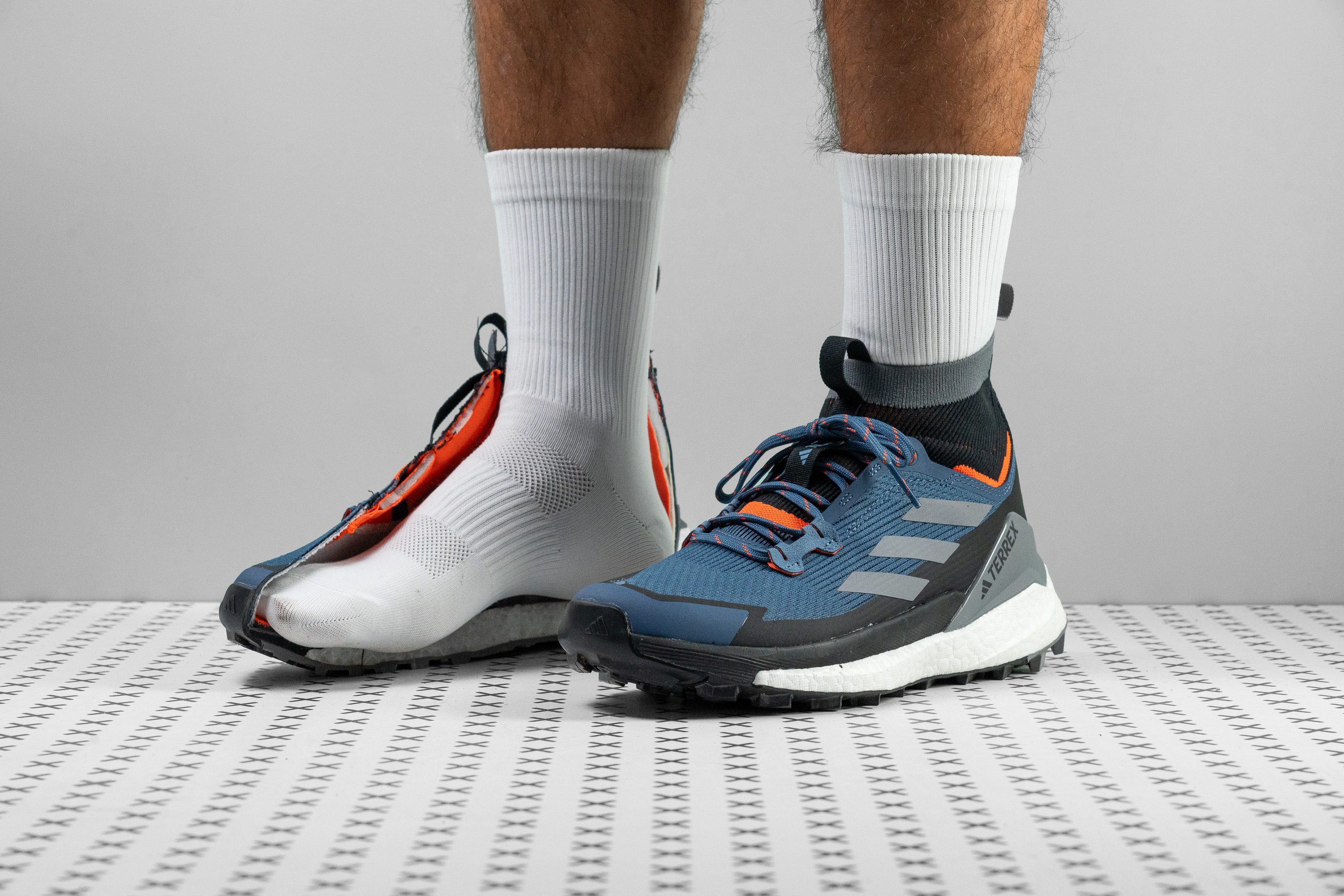Our verdict
- Top pick in best hiking boots
- Top pick in best lightweight hiking boots
Pros
- Extremely well-cushioned
- Exceptionally lively and bouncy underfoot
- Luxuriously padded interior
- Grippy and durable lugs
- Tackles wet surfaces confidently
- Very flexible and forgiving
- Excellent airflow
- Feels incredibly stable underfoot
- Supportive heel collar
- Rockered midsole
- Relatively lightweight
- High-quality construction
- Eye-catching design
Cons
- Needs breaking in
- Tricky to put on
- Expensive
Audience verdict
- Top 15% in hiking boots
- Top 1% in Adidas hiking boots
Comparison
The most similar hiking boots compared
+ + Add a shoe | |||||
|---|---|---|---|---|---|
| Audience score | 90 Great! | 79 Decent! | 81 Good! | 83 Good! | |
| Price | $200 | $195 | $180 | $110 | |
| Trail terrain | LightModerate | LightModerate | LightModerate | Moderate | |
| Shock absorption | High | High | High | Low | |
| Energy return | High | Moderate | High | High | |
| Weight lab Weight brand | 15 oz / 425g 15 oz / 425g | 17.4 oz / 494g 18 oz / 510g | 13.7 oz / 388g | 18.1 oz / 513g 17.1 oz / 485g | |
| Lightweight | ✓ | ✓ | ✓ | ✗ | |
| Breathability | Breathable | Warm | Warm | Moderate | |
| Use | Day HikingSpeed HikingLight Hiking | Day HikingSpeed HikingLight HikingSnow | Day HikingSpeed HikingLight HikingSnow | Light HikingUrban hikingBeginners | |
| Orthotic friendly | ✓ | ✓ | ✓ | ✓ | |
| Drop lab | 14.4 mm | 9.0 mm | 10.1 mm | 14.0 mm | |
| Size | True to size | True to size | True to size | True to size | |
| Midsole softness | Soft | Balanced | Soft | Firm | |
| Difference in midsole softness in cold | Big | Normal | Big | Small | |
| Heel counter stiffness | Flexible | Flexible | Flexible | Flexible | |
| Stiffness | Flexible | Moderate | Flexible | Moderate | |
| Outsole hardness | Very soft | Average | Average | Soft | |
| Waterproofing | - | Waterproof | Waterproof | - | |
| Material | KnitMesh | LeatherTextile | Textile | Leather | |
| Season | SummerAll seasons | Winter | Winter | All seasons | |
| Toebox durability | Decent | Bad | Decent | - | |
| Heel padding durability | Good | Bad | Bad | - | |
| Outsole durability | Good | Decent | Decent | - | |
| Width / fit | Wide | Medium | Medium | Narrow | |
| Toebox width | Medium | Narrow | Medium | Narrow | |
| Lug depth | 3.7 mm | 5.0 mm | 4.1 mm | 3.4 mm | |
| Heel stack lab | 38.4 mm | 34.4 mm | 35.4 mm | 34.6 mm | |
| Forefoot | 24.0 mm | 25.4 mm | 25.3 mm | 20.6 mm | |
| Widths available | Normal | NormalWide | NormalWideX-Wide | NormalWide | |
| Technology | - | Gore-TexVibram | Gore-TexVibram | Ortholite | |
| Cut | Mid cut | Mid cut | Mid cut | Mid cut | |
| Removable insole | ✓ | ✓ | ✓ | ✓ | |
| Ranking | #6 Top 15% | #38 Bottom 7% | #34 Bottom 17% | #31 Bottom 24% | |
| Popularity | #14 Top 35% | #12 Top 30% | #3 Top 8% | #8 Top 20% |
Who should buy
We recommend the Adidas Terrex Free Hiker 2 as a great choice for:
- Speedy hikers looking for a lightweight boot that feels swift and nimble.
- Fashion-minded individuals in the market for an eye-catching boot that is a healthy mix of form and function.
- Backpackers looking for a well-cushioned and stable shoe for schlepping heavy loads long distances.
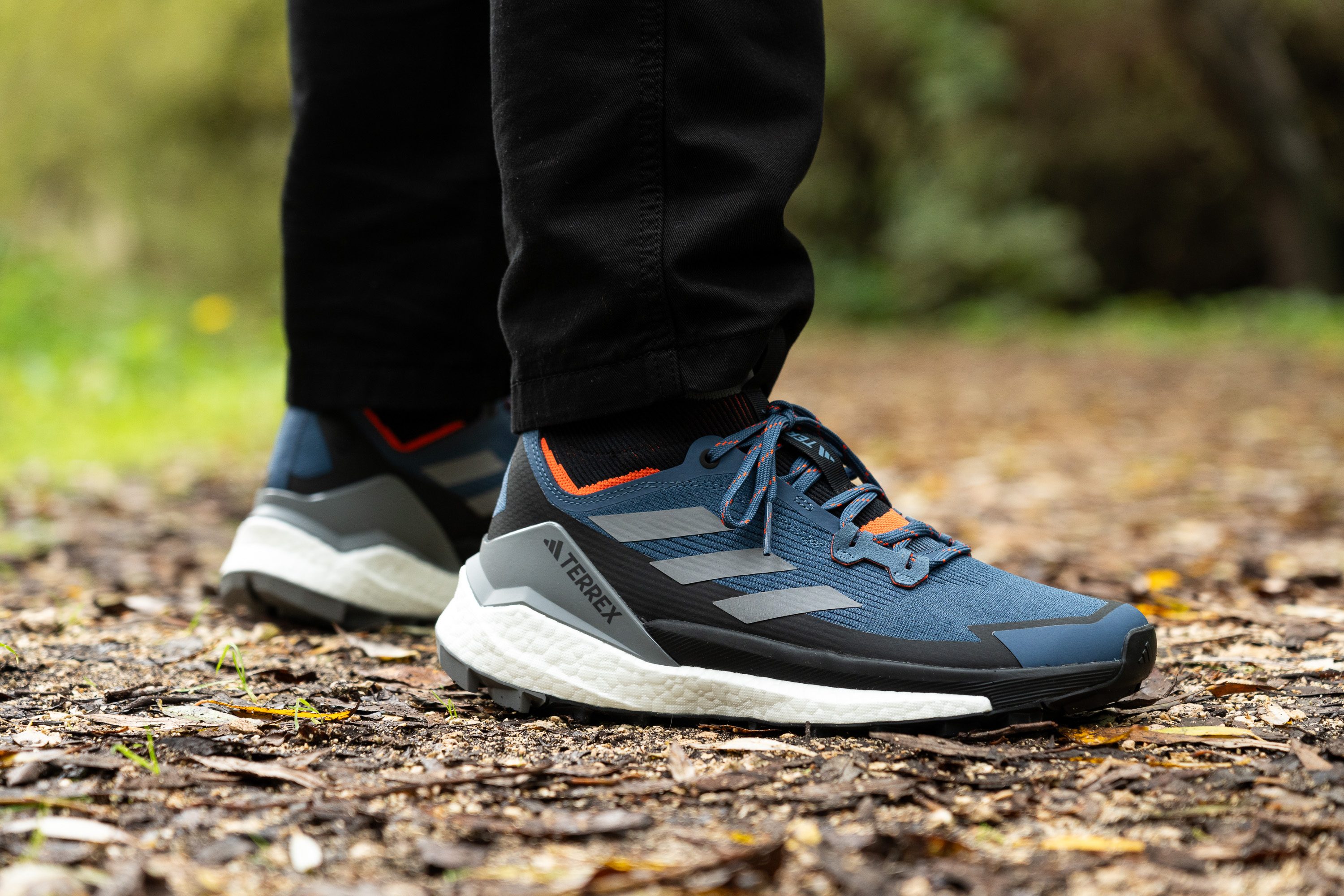
Who should NOT buy
The Free Hiker 2 needs to be broken in before unlocking its true comfy potential. For those in need of a boot that’s good to go right out of the box, we recommend the Altra Lone Peak Hiker 2 which is also a little easier to slip on in a pinch.
The Free Hiker too might be light on the foot but it’s quite heavy on the wallet. For a more budget-friendly option, check out the Timberland Sprint Trekker which can also speedily conquer the trails.
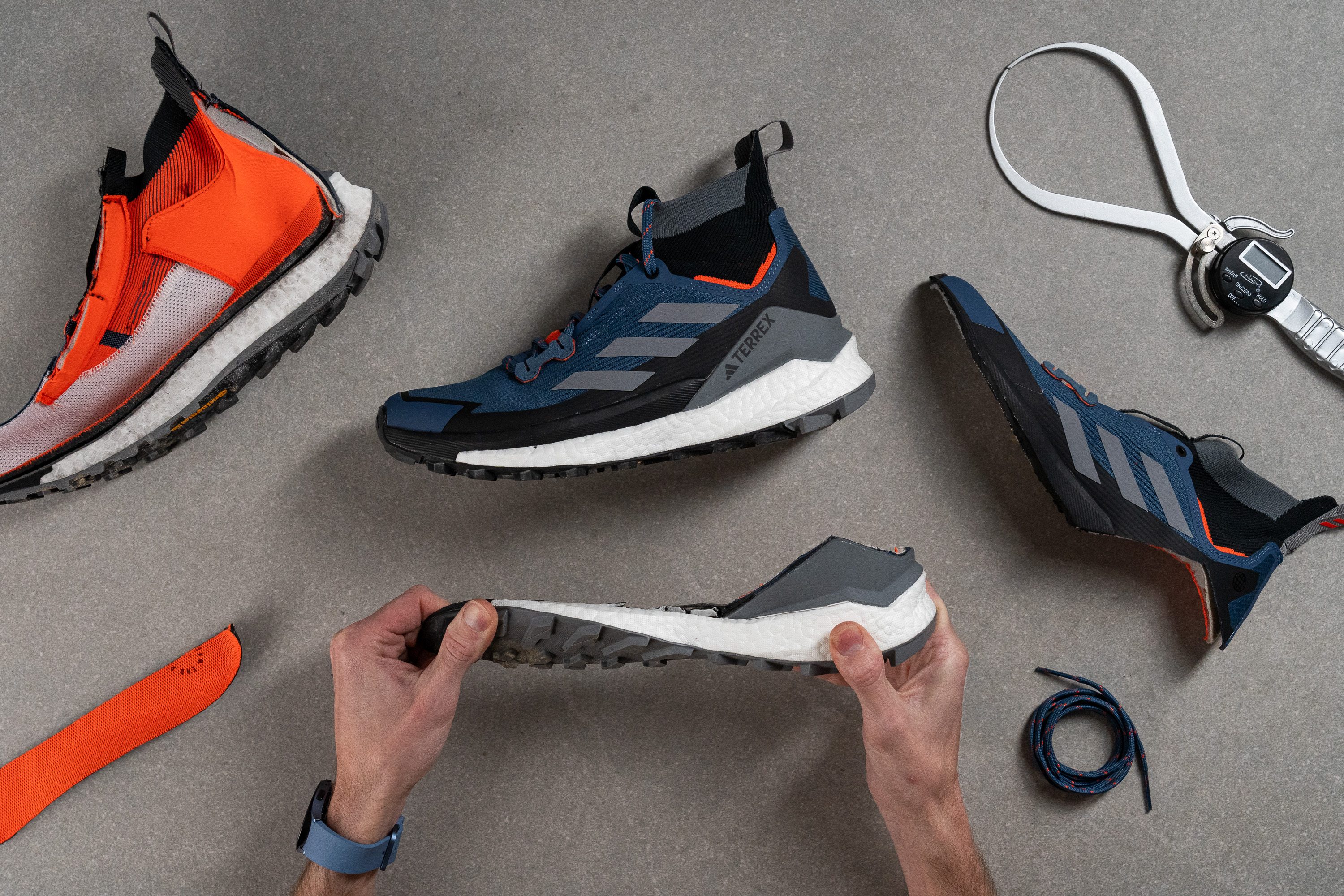
Cushioning
Shock absorption
The Terrex Free Hiker 2 is a blessing for tired feet and sore joints thanks to its cloud-like Boost cushioning which dampens impact like a pro.
Our shock absorption test recorded some of the highest readings of 121 SA, confirming that this Adidas boot is one of the cushiest out there! It is extremely comfortable for long-distance hikes.
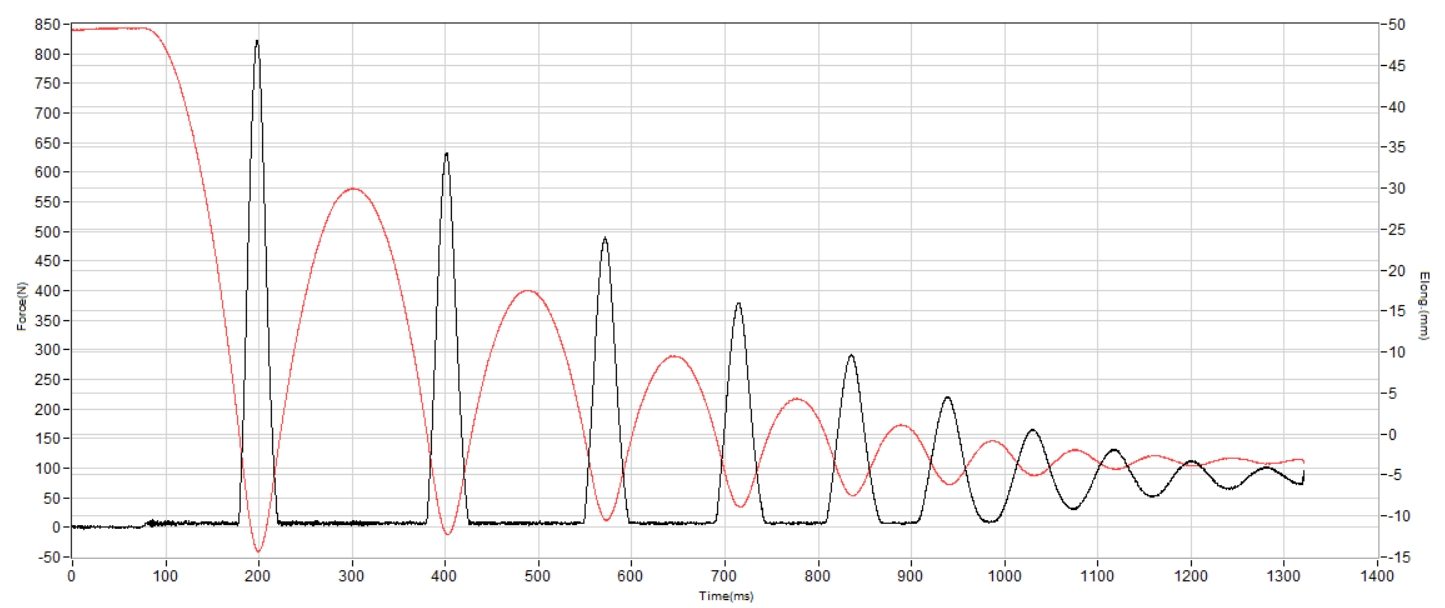
| Terrex Free Hiker 2 | 121 SA |
| Average | 93 SA |
Energy return
Not only is the Free Hiker 2's Boost midsole soft, but it’s got a nice bounce to it too!
With some of the highest energy return scores we have ever recorded in the category (66%), this Adidas boot feels more like a nimble high-top trail running shoe than a hiking boot. The Boost added a jolly pep to our step, helping us traverse the trails swiftly and breezily.
| Terrex Free Hiker 2 | 66.0% |
| Average | 50.5% |
Heel stack
The Free Hiker 3 boasts quite a significant amount of foam underfoot, with a higher-than-average stack that measures 38.4 mm thick at the heel.
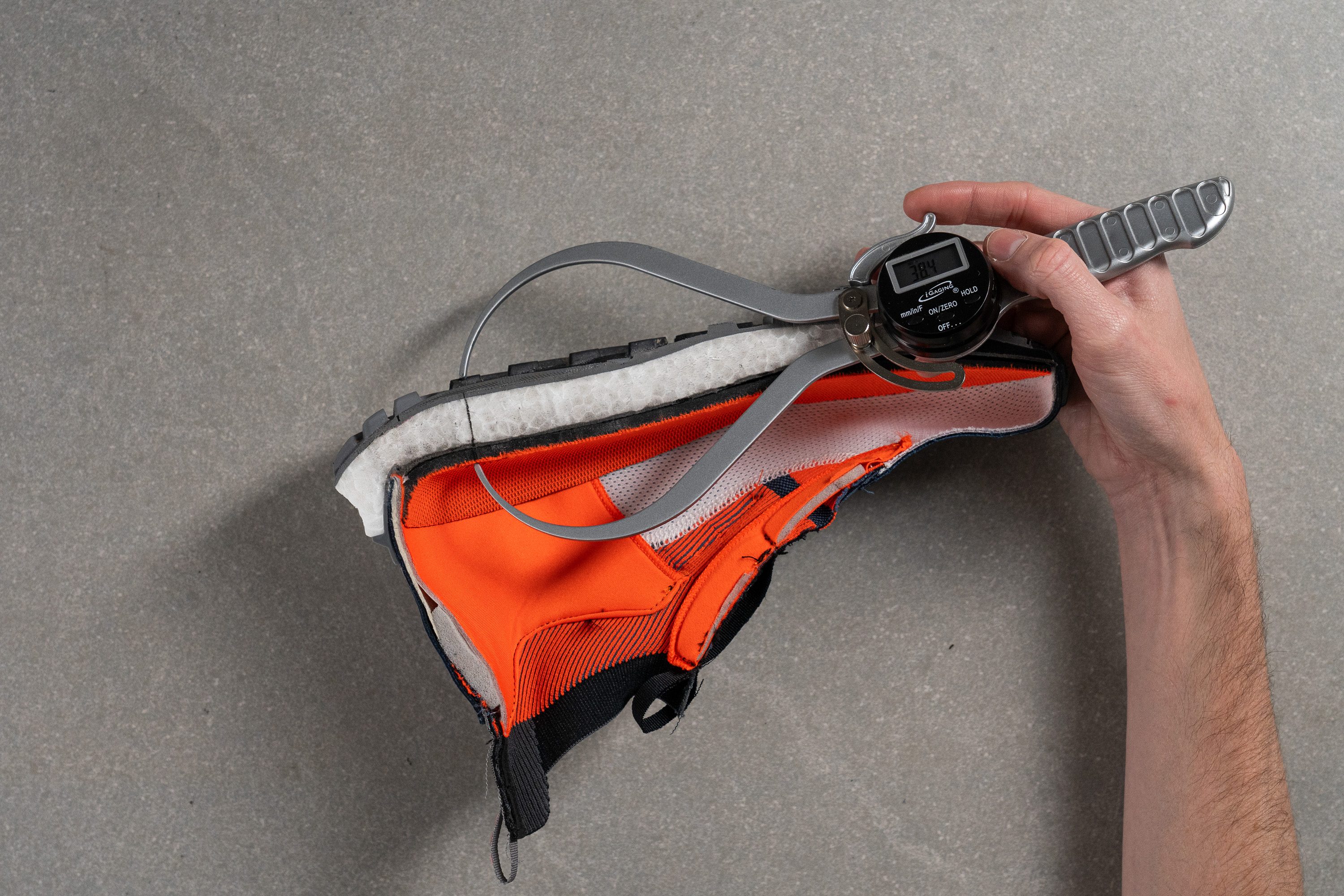
This means that we were really able to sink into the midsole and savor the plush cushioning the boot has to offer.
| Terrex Free Hiker 2 | 38.4 mm |
| Average | 36.3 mm |
Forefoot stack
At 24 mm thick according to our caliper measurements, the Free Hiker 2’s forefoot stack falls within the average range for hiking boots we’ve tested so far. This presents a healthy balance of protective cushioning and an intuitive sense of the ground below.
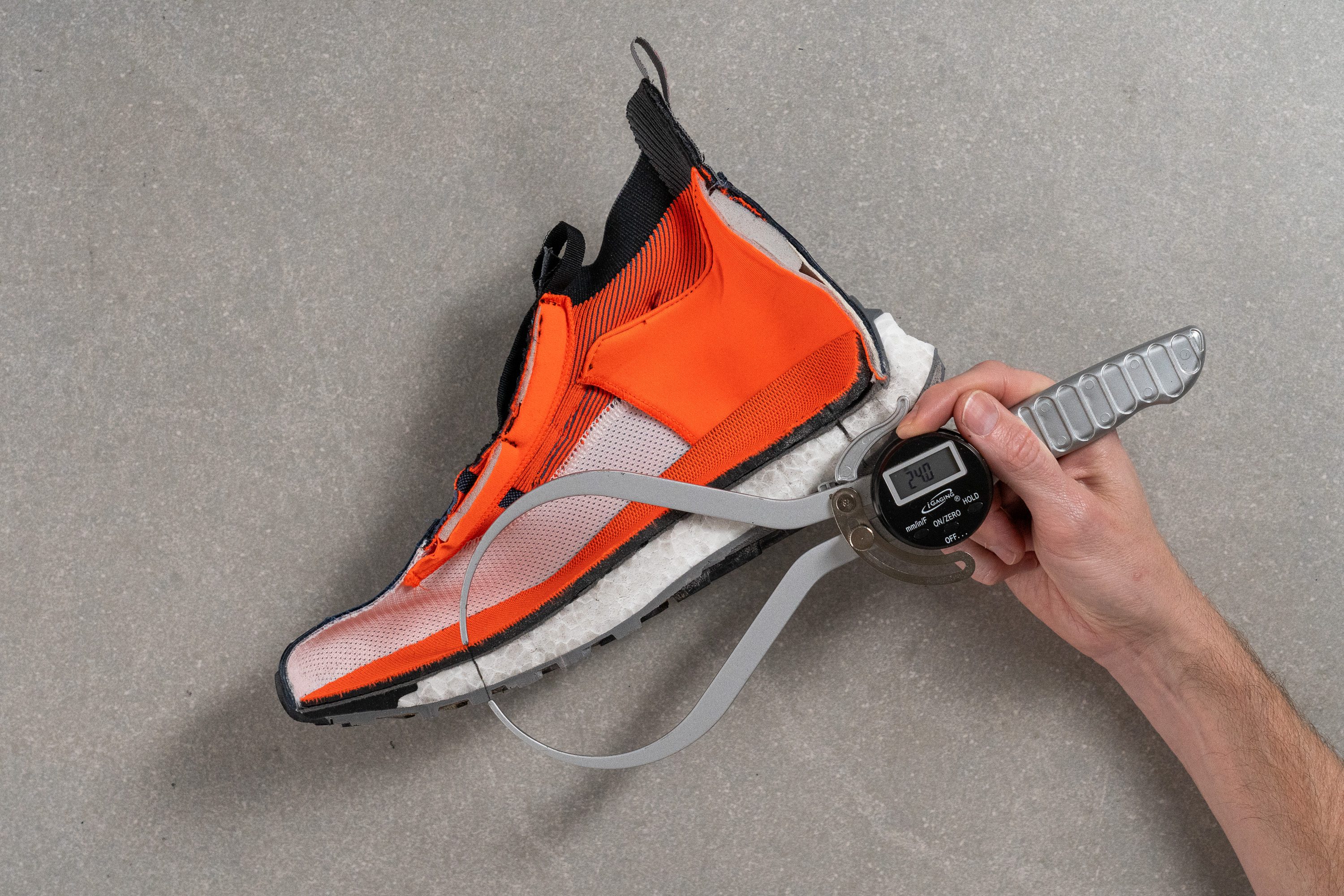
| Terrex Free Hiker 2 | 24.0 mm |
| Average | 23.0 mm |
Drop
The difference in our stack measurements leaves the Free Hiker 2 with a heel drop of 14.4 mm. This rather steep offset indicates a heel that is much more elevated than the forefoot which is great for reducing stress on the ankles and Achilles Tendons, especially when lugging a heavy backpack across long distances.
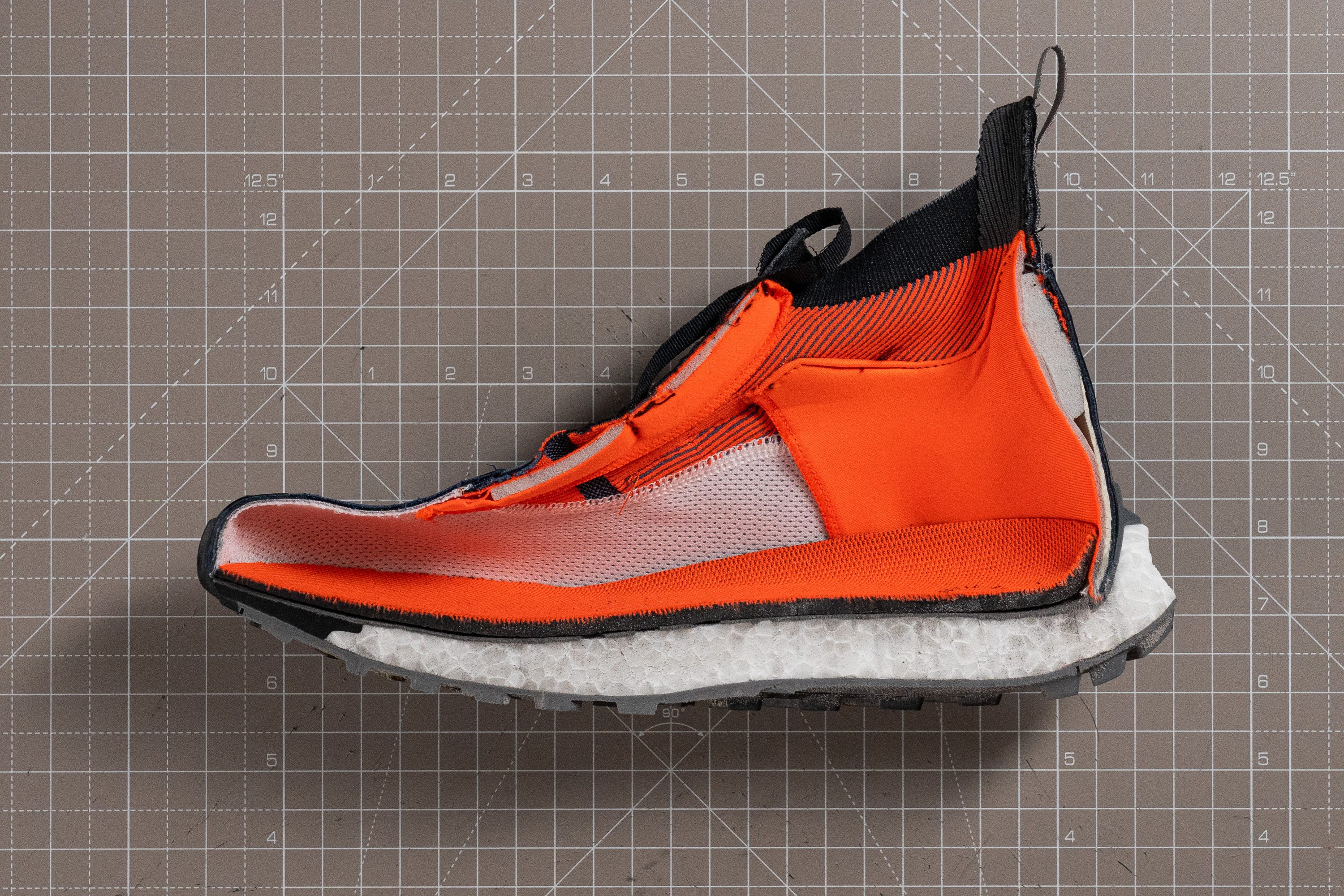
| Terrex Free Hiker 2 | 14.4 mm |
| Average | 13.3 mm |
Midsole softness
While hiking boots tend to boast rather firm midsoles, we enjoyed an extremely plush ride with the Free Hiker 2 which not only softened the blow of hard landings but kept us feeling luxuriously comfortable while testing this boot.
This heavenly softness is confirmed by our durometer which gave us a much softer-than-average reading of 15.4 HA.
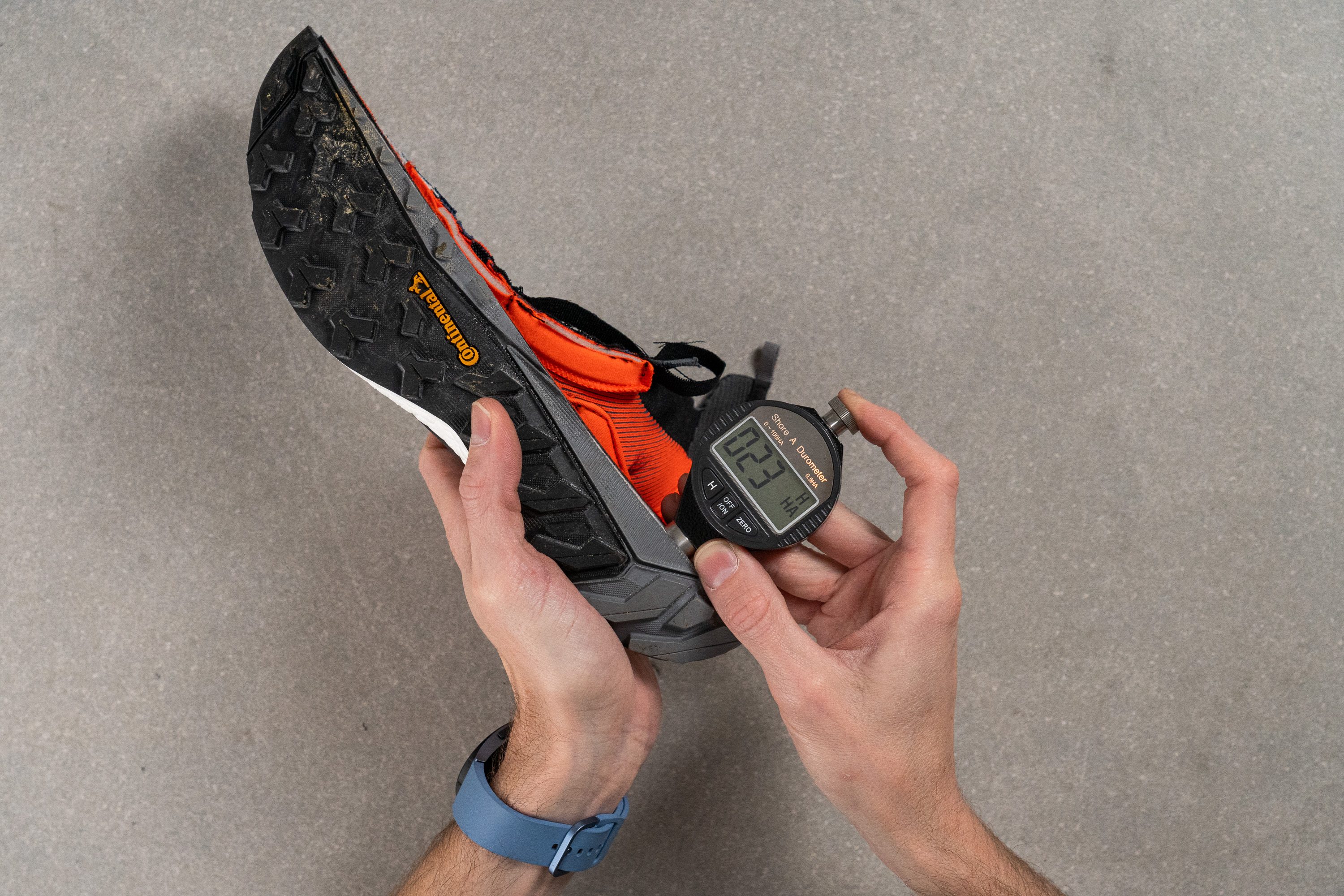
| Terrex Free Hiker 2 | 15.4 HA |
| Average | 28.4 HA |
Size and fit
Size
Adidas Terrex Free Hiker 2 fits true to size (55 votes).
Internal length
| Terrex Free Hiker 2 | 267.1 mm |
| Average | 271.4 mm |
Width / Fit
Trying the Free Hiker 2 in a standard D medium width, we were surprised by the amount of internal space it provided!
Having poured a gel mold of the boot's interiors, we were able to measure its dimensions more precisely. And indeed, our caliper showed a notably wider-than-average reading of 97.9 mm!
Looks like this Adidas boot can accommodate many different footshapes (and bunions) but are less than ideal for skinny feet. You can also expect enough space for thicker socks and foot swelling on longer hikes.
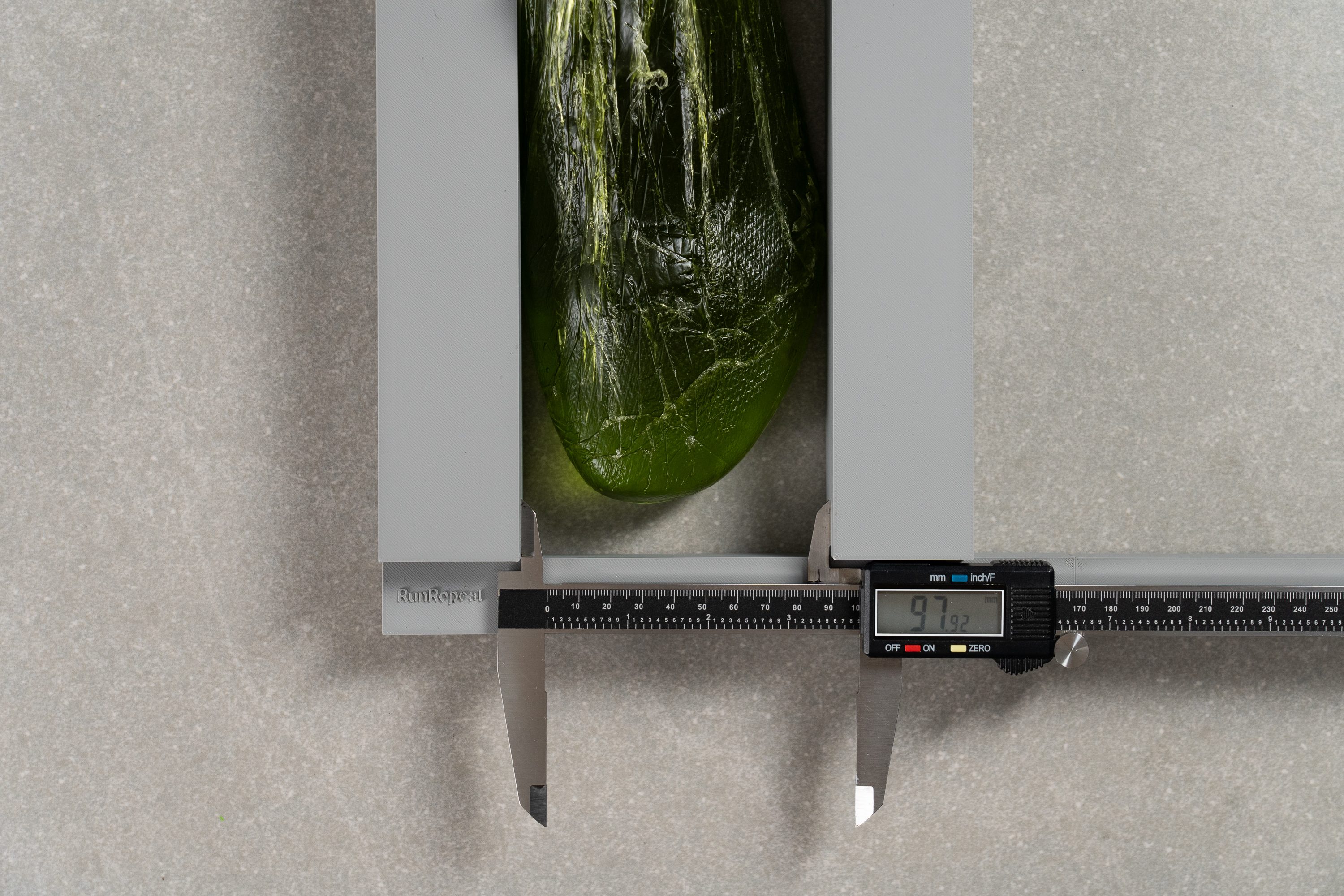
| Terrex Free Hiker 2 | 97.9 mm |
| Average | 93.8 mm |
Toebox width
The boot's toebox shape returns to a more average width near the toes. We measured a standard reading of 71.4 mm in the big toe area - exactly the same as the category average.
That way, we get a pleasantly accommodating fit that doesn't feel excessively roomy for medium-width feet.
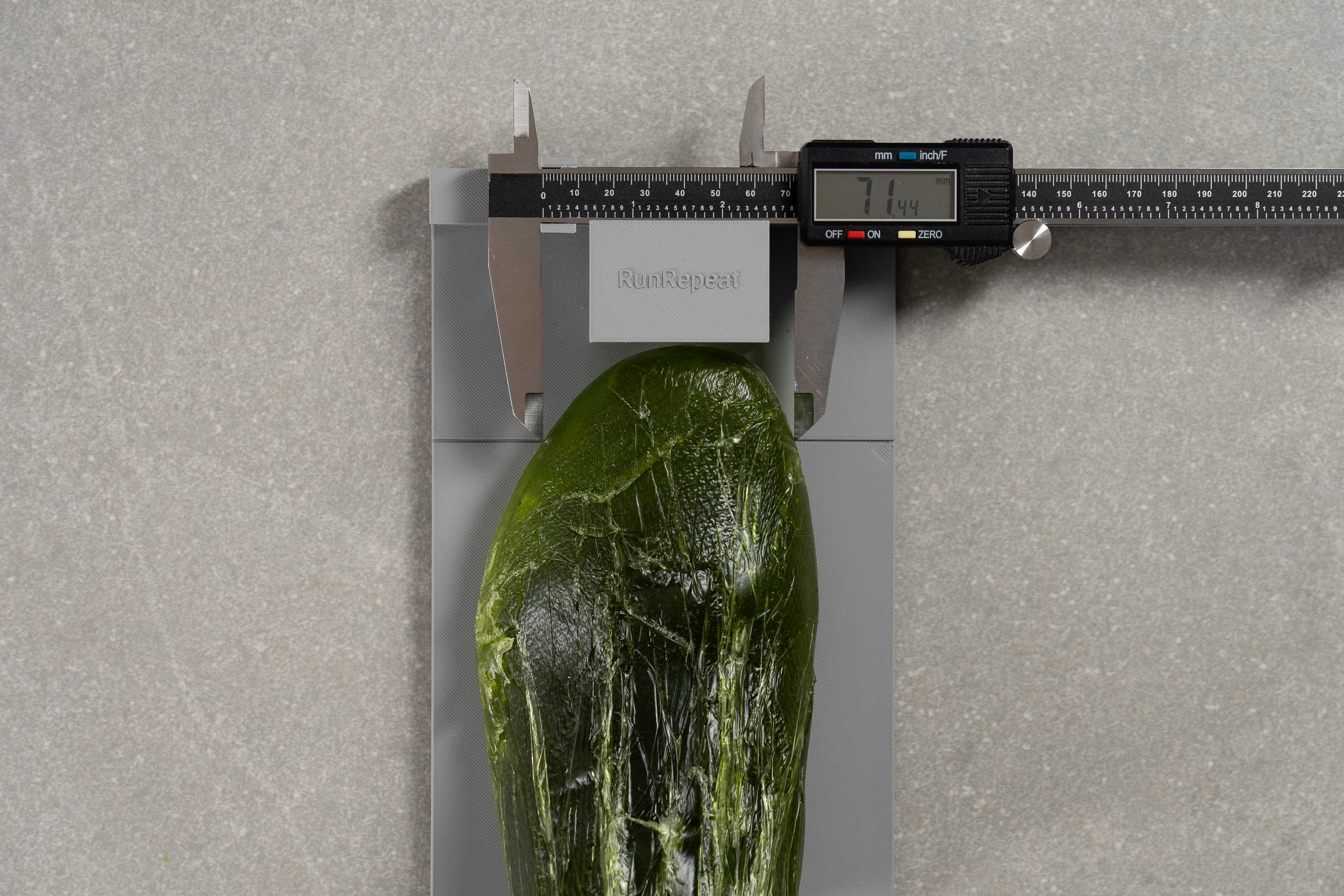
| Terrex Free Hiker 2 | 71.4 mm |
| Average | 71.2 mm |
Toebox height
The boot also treated our toes to a decent amount of vertical space. Measuring its toebox height returned a regular reading of 27.8 mm.
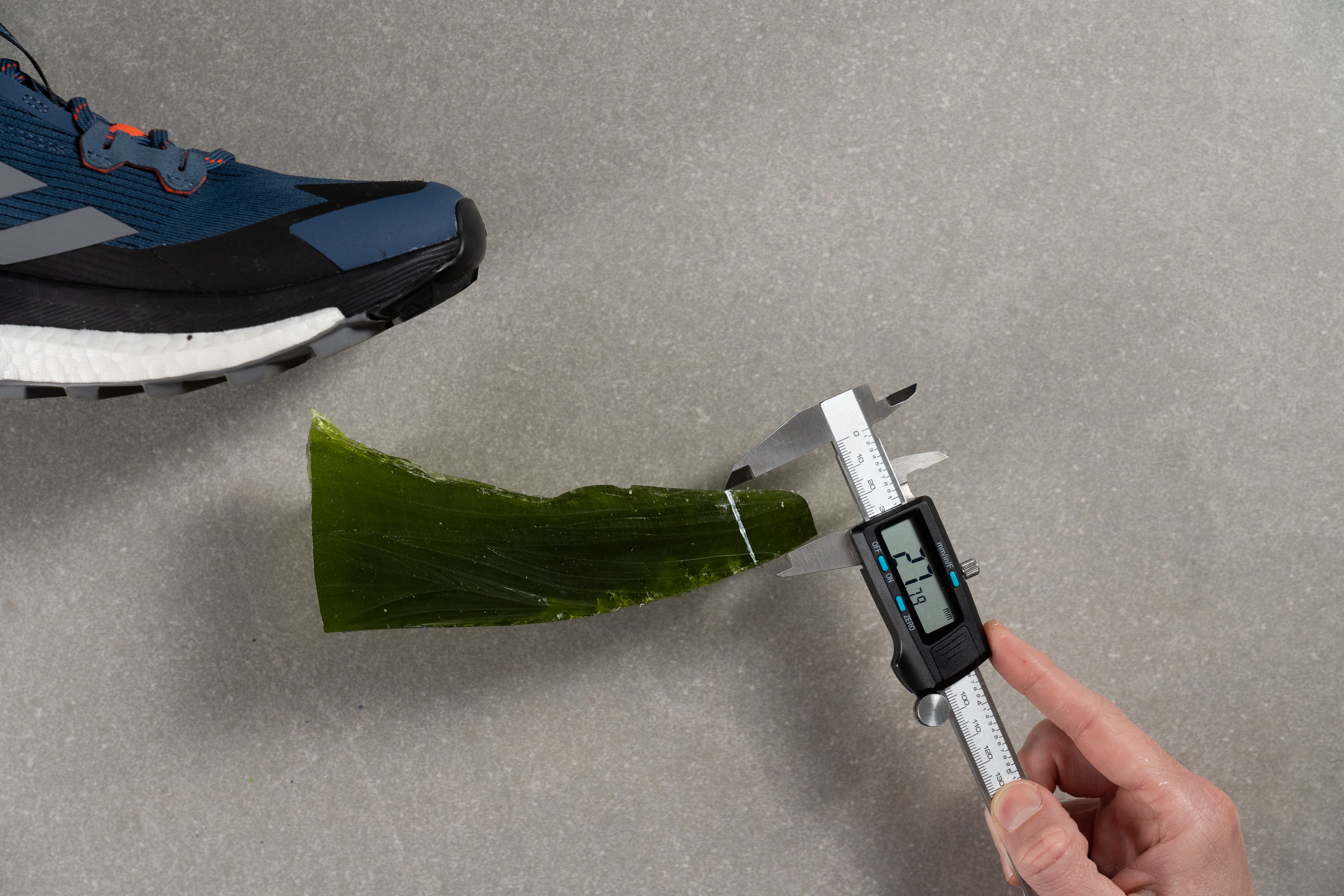
| Terrex Free Hiker 2 | 27.8 mm |
| Average | 27.4 mm |
Traction / Grip
Lug depth
Using our caliper, we measured the Free Hiker 2’s lugs to be 3.7 mm thick which is right around the average range for hiking boots.
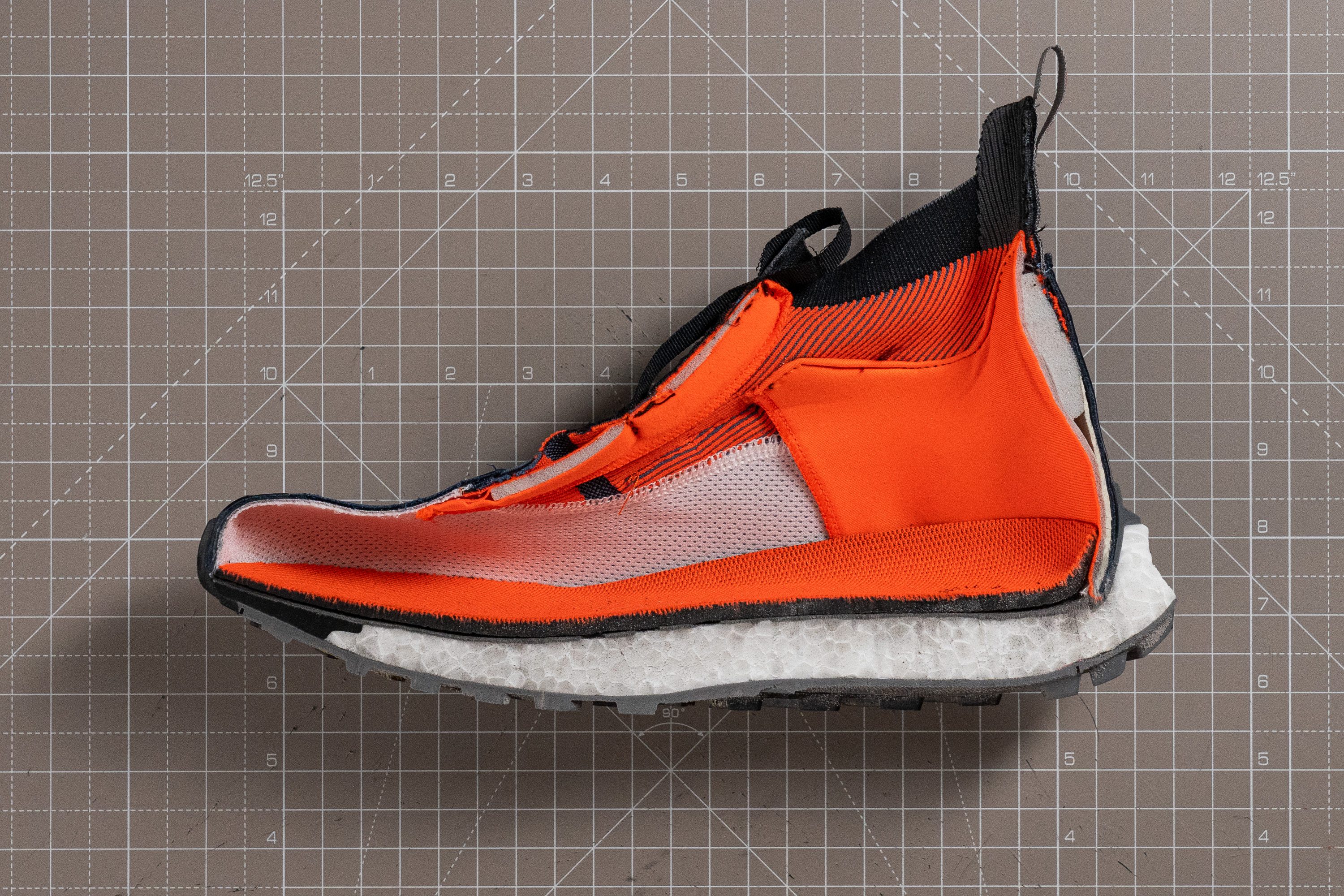
By using a combination of straight and chevron-shaped lugs in a strategic pattern doesnt just allow the boot to grip surfaces extremely well during our tests, but means that we were also able to easily cast off mud and debris quite easily. What’s more, the Continental rubber that makes up the outsole provided us with incredibly reliable traction whether we were in dry or wet conditions.
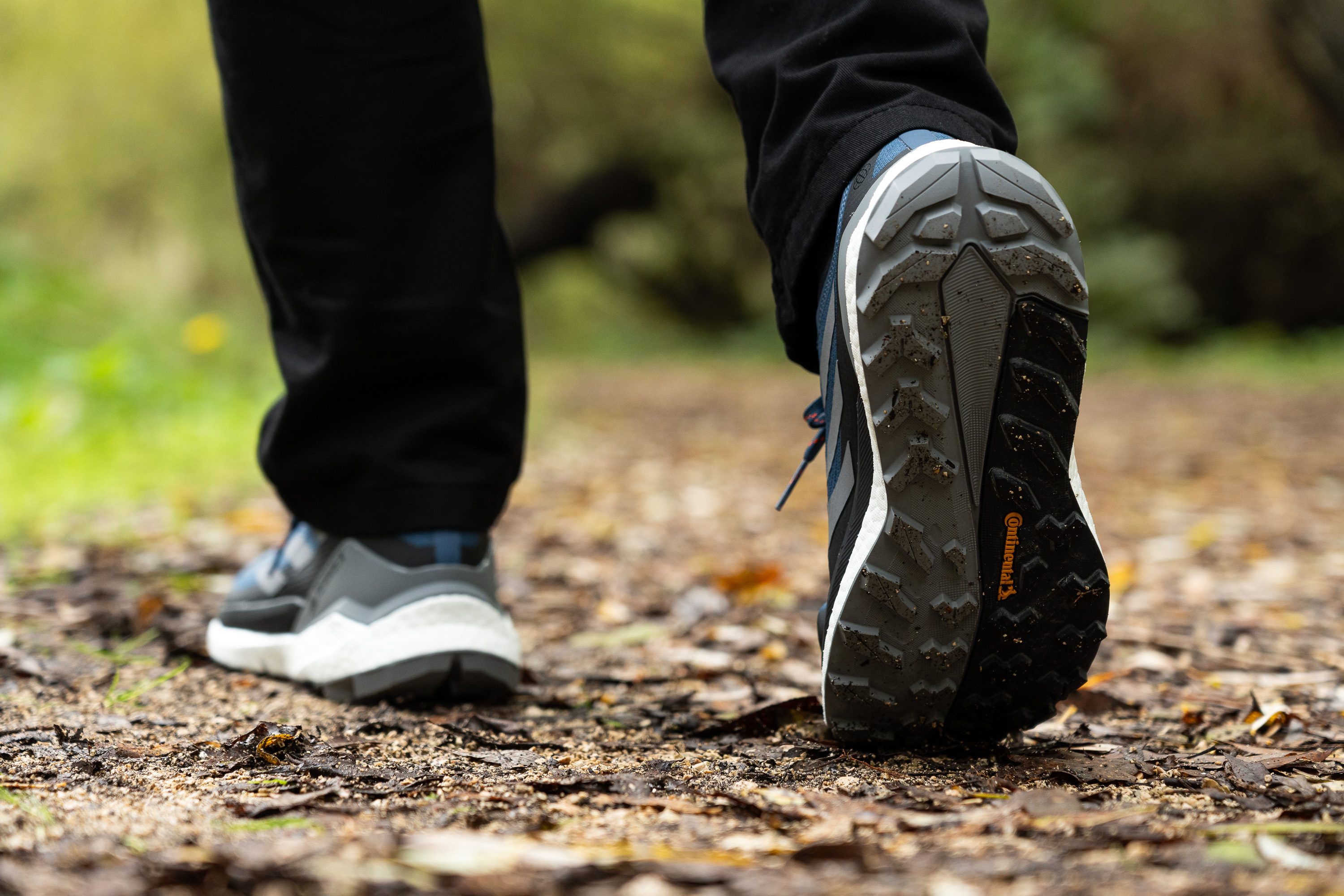
| Terrex Free Hiker 2 | 3.7 mm |
| Average | 4.3 mm |
Flexibility / Stiffness
Taking the Free Hiker 2 through our flexing tester revealed that the boot requires as little as 16.0N of force to bend by 30 degrees. It implies that this Adidas boot is much more flexible than the average hiking boot, and is actually more on par with the flexibility of trail running shoes.
During our wear test, the Free Hiker 2 bent along with our foot with relative ease offering a comfortable and natural ride. But on the flip side, that pliability can make it feel less supportive, especially if you intend to carry a heavy load.
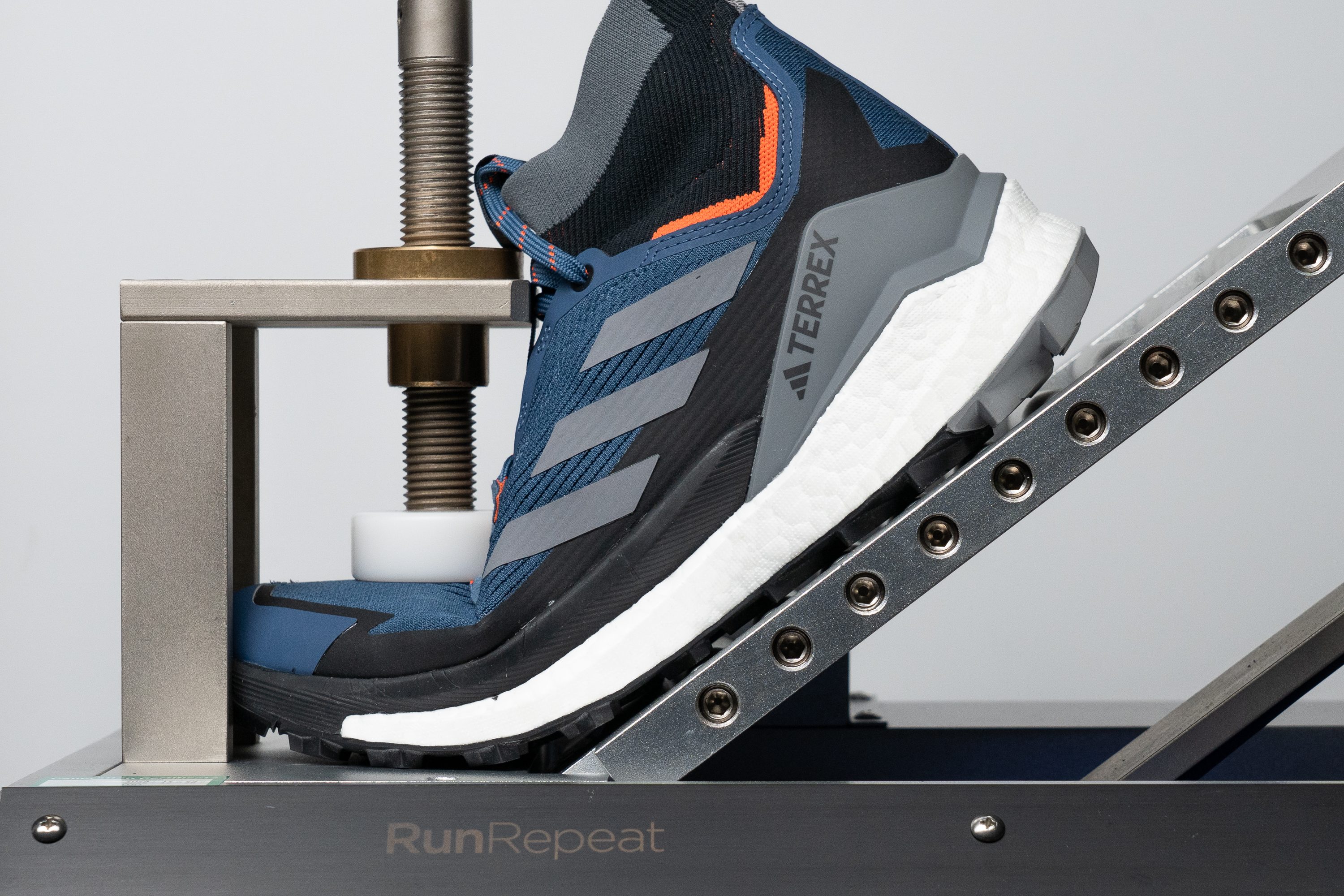
| Terrex Free Hiker 2 | 16.0N |
| Average | 31.5N |
Weight
The Free Hiker 2 is a lean, mean, trailblazing machine that tips the scale at only 15 oz (425g). This makes it significantly lighter than the average boot and a great choice for speedy hikers with a little more pep in their step.
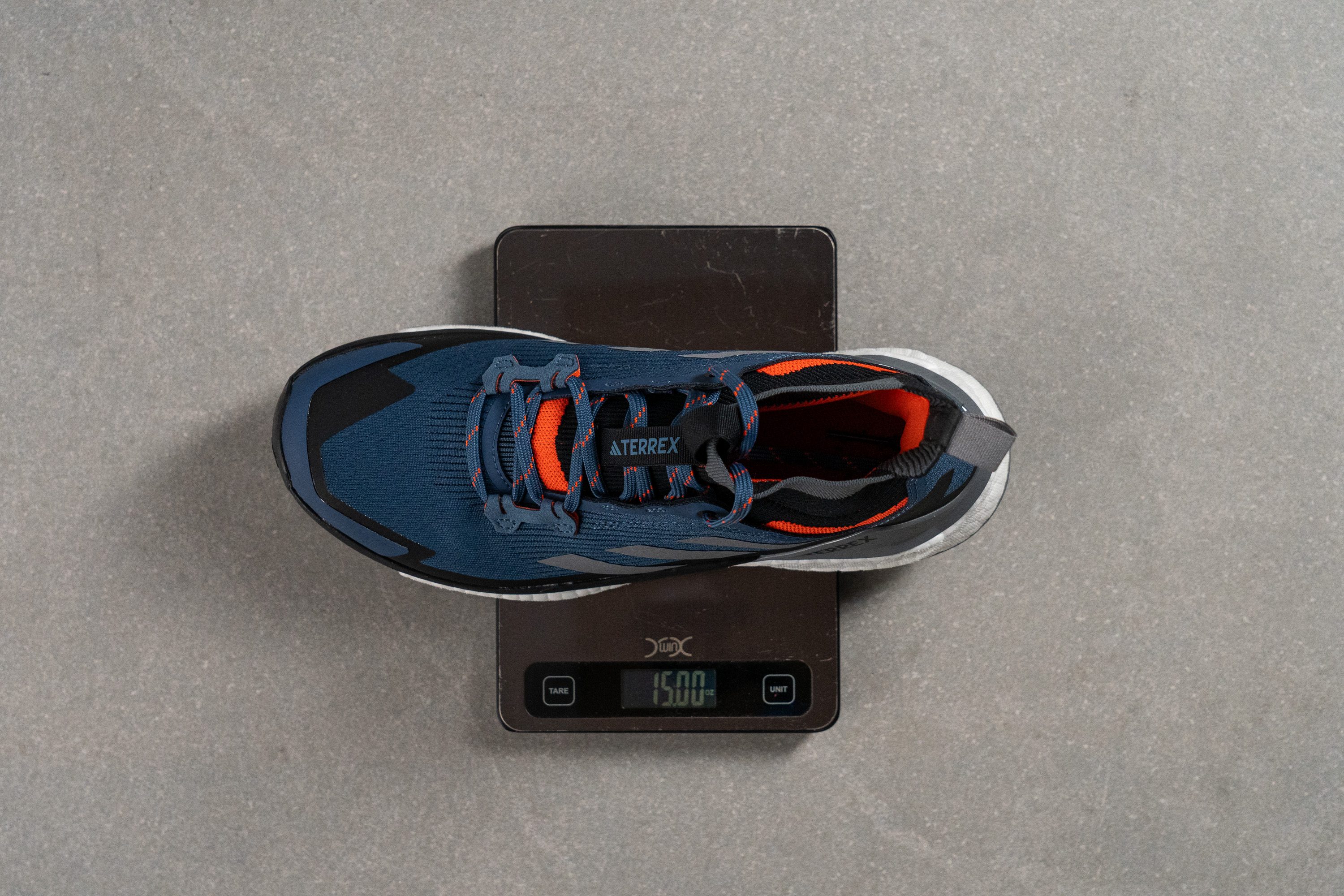
Further contributing to the Free Hiker 2’s light and swift nature is the midsole’s slightly rockered geometry that promotes smooth heel-to-toe transitions which served to improve our walking cadence while out on the trails.
| Terrex Free Hiker 2 | 15.0 oz (425g) |
| Average | 18.7 oz (531g) |
Breathability
To see how breathable the boot is, we pumped smoke into the Free Hiker 2 in order to see how easily it vents out. As the video clearly demonstrates, the Free Hiker 2 allows smoke to billow out quickly and evenly throughout the porous boot, earning it a perfect 5 out of 5. This makes the Free Hiker 2 an airy companion that’s an excellent choice for those warm summer hikes.
The source of the Free Hiker 2’s stellar airflow remains a mystery when inspecting a backlit cross-section of the boot’s upper. Contrary to our expectations, the boot entirely blocks any light from shining through its seemingly opaque upper.
We turn to our microscope for more answers and we can see that the upper mesh is made up of tightly woven locks of fiber that form a dense weave. While the gaps between these braids are apparently too tight to allow light to seep through, they evidently promote sufficient ventilation throughout the boot.
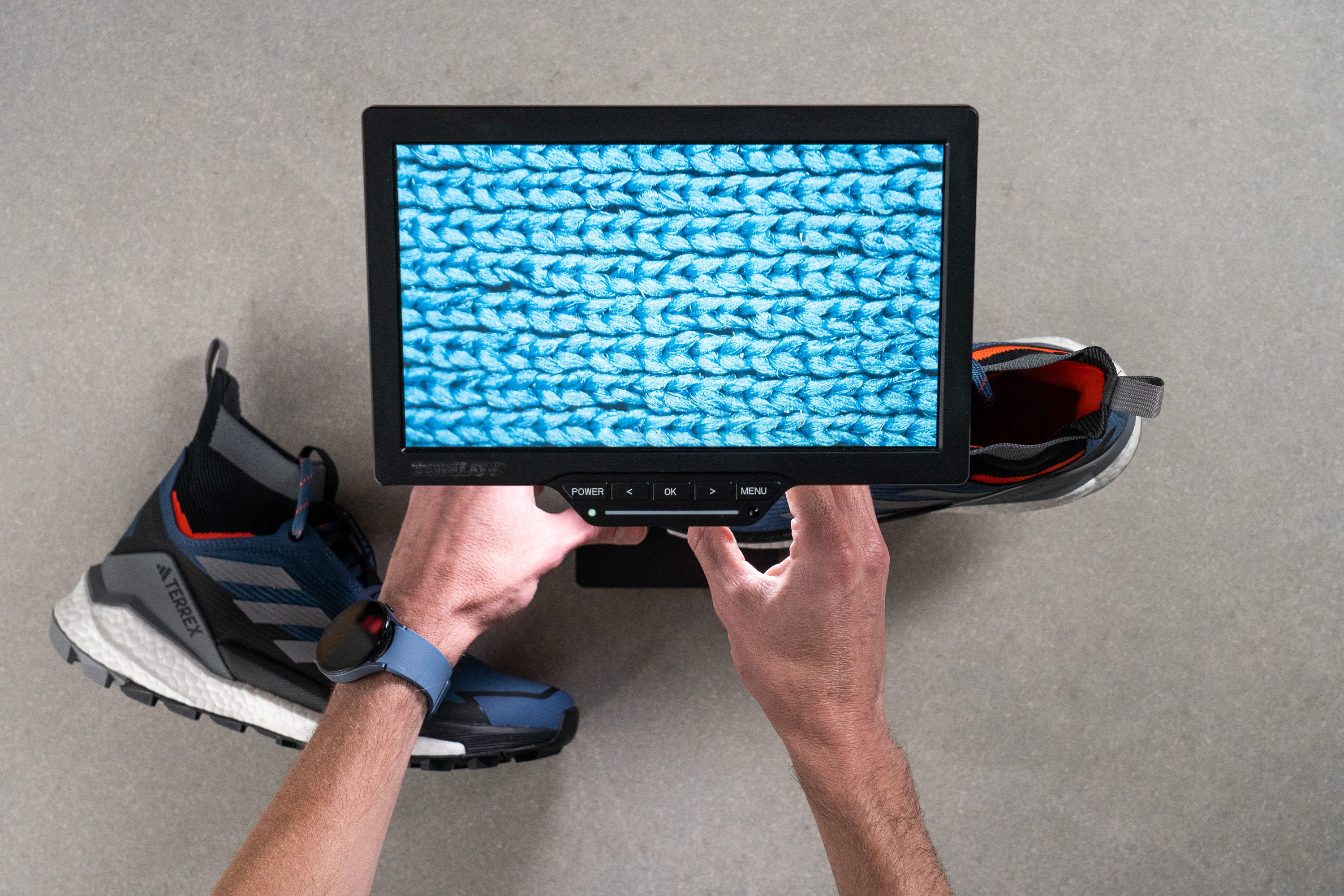
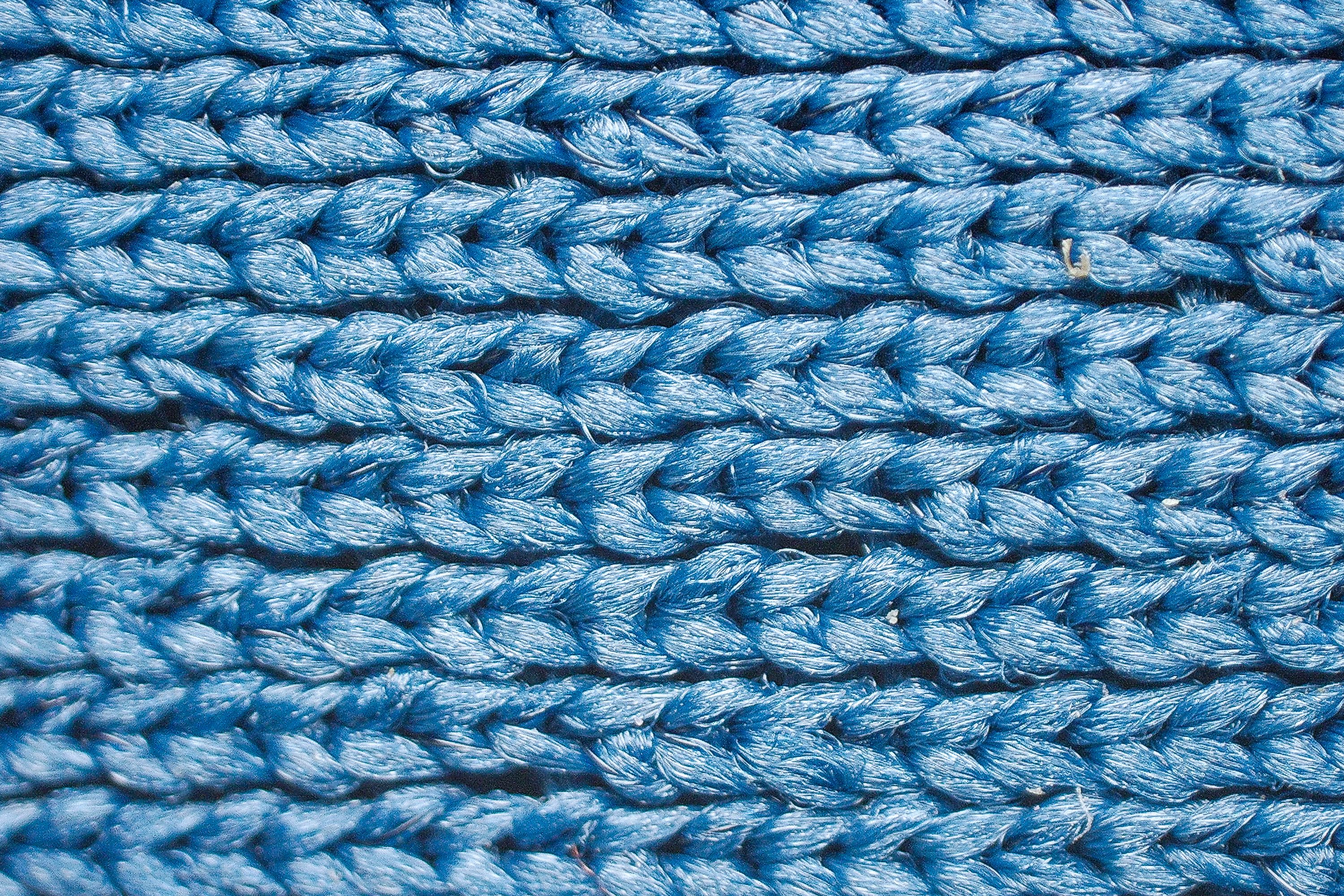
| Terrex Free Hiker 2 | 5 |
| Average | 1.3 |
Stability
Lateral stability test
The Free Hiker 2 feels well-balanced as shift our weight from side to side in the shoe, making it an excellent and supportive choice when hiking with a heavy pack.
We wouldn’t typically expect this from a boot with such a healthy amount of soft foam underfoot, though Adidas successfully offsets any imbalance through a number of features we’ll explore below, not least of which is the subtle yet effective rigid insert at the heel that proudly boasts the Terrex name.
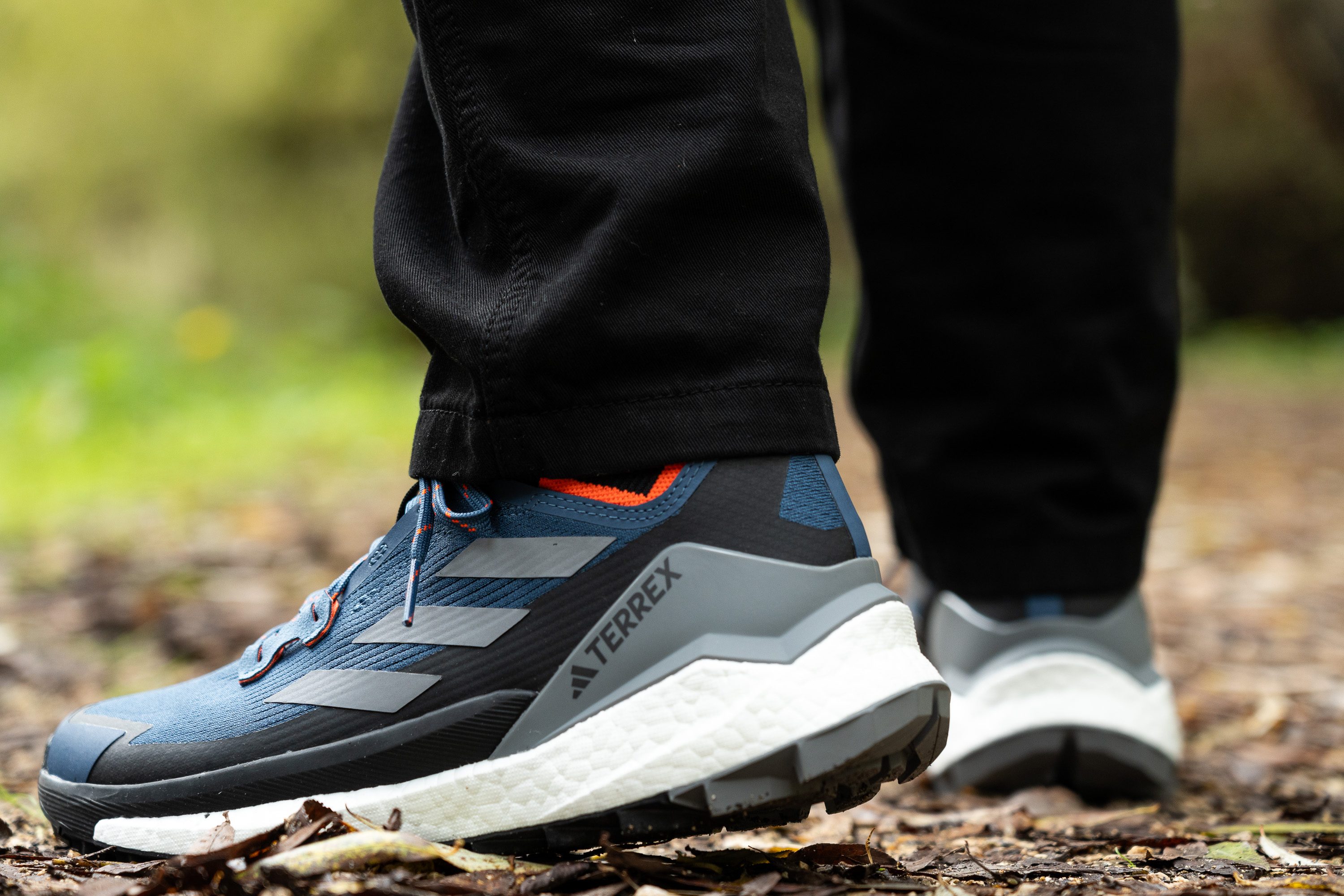
Torsional rigidity
We were met with a lot of resistance as we attempted to bend and twist the Free hiker 2 in our hands, leading us to give it a torsional rigidity score of 4 out of 5. This rather rigid nature plays a large part in the boot’s stable underfoot sensation by allowing it to maintain a level platform as we move. As such, rolled ankles are extremely unlikely in this supportive boot.
| Terrex Free Hiker 2 | 4 |
| Average | 4.4 |
Heel counter stiffness
The Free Hiker 2’s heel counter is moderately stiff, earning a 3 out of 5 in our subjective evaluation. This provides a good balance of support and comfort as the boot holds our foot in place securely without squeezing our heels and ankles too much, while still having enough give to allow for some natural lateral movements.
| Terrex Free Hiker 2 | 3 |
| Average | 3.6 |
Midsole width - forefoot
Using our caliper, we measured the Free Hiker 2’s midsole to be 114 mm wide at the forefoot which is right about the average for hiking boots. This gives us a platform that’s wide enough to be reliable and stable over any surface, without feeling overly blocky underfoot.
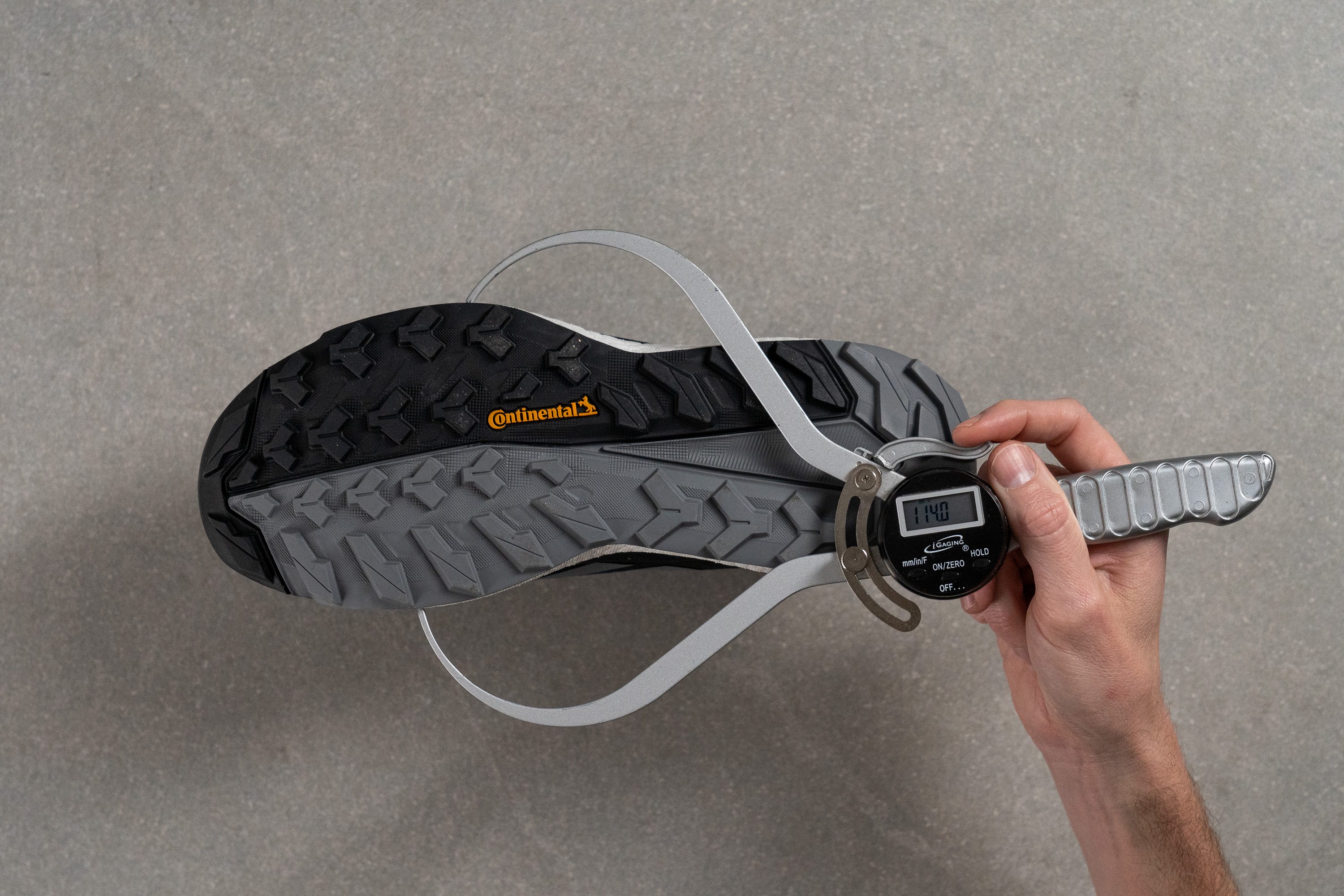
| Terrex Free Hiker 2 | 114.0 mm |
| Average | 111.5 mm |
Midsole width - heel
The Free Hiker 2’s midsole is also within the average range at the heel, which measures 91.3 mm wide. This should be enough surface area to bite into surfaces well and promote a surefooted stride for most hikers.
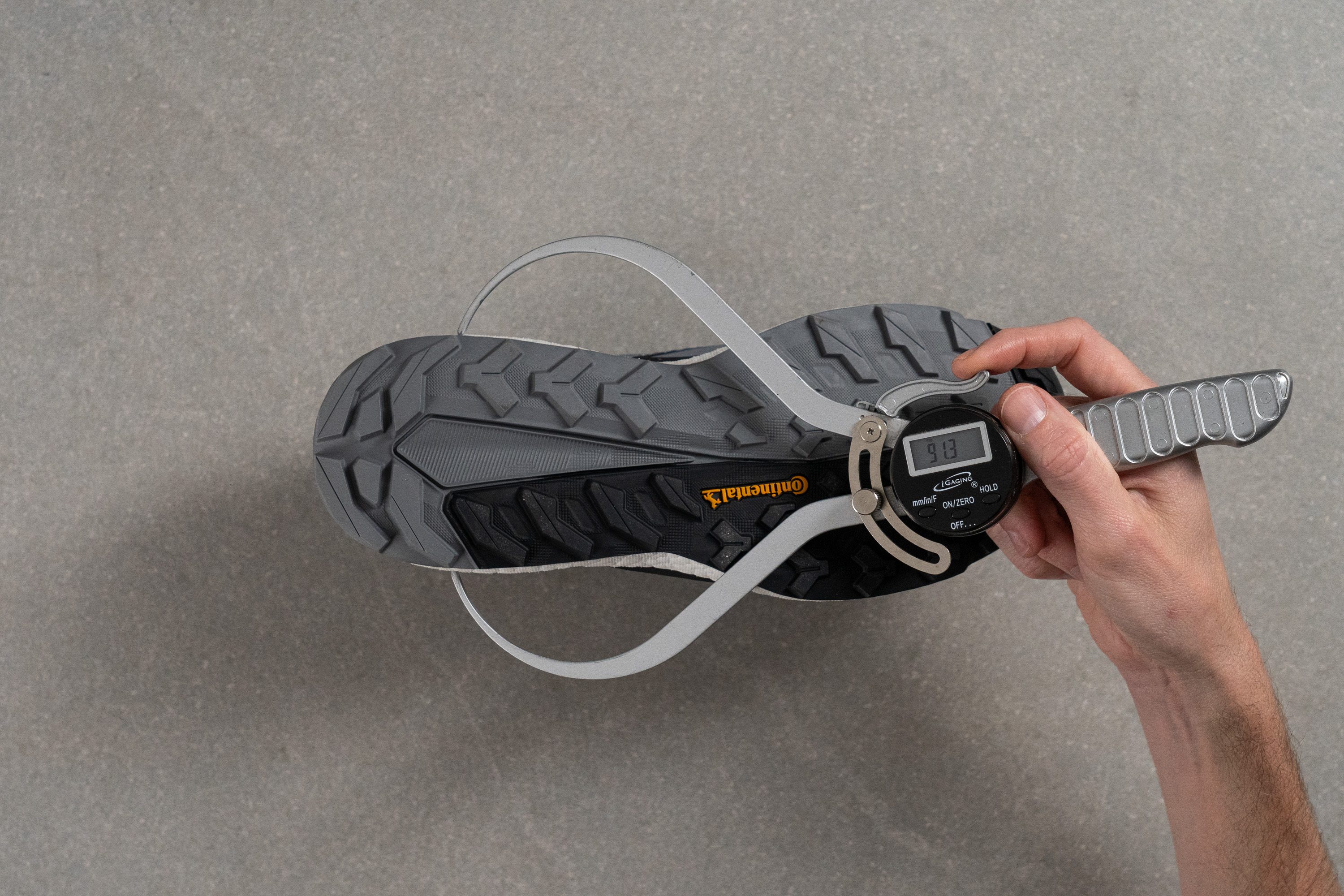
| Terrex Free Hiker 2 | 91.3 mm |
| Average | 87.6 mm |
Durability
Toebox durability
The use of mesh and other light materials in the upper didn’t give us much hope regarding its durability. To test this, we fired up our Trusty Dremel to 5K RPM and applied it to the Free Hiker 2’s toebox with 3.2N of force, making sure to make contact with both the reinforced and unreinforced parts of the upper mesh.
The tool immediately kicked up a flurry of debris, but once the four seconds were up, we found that we hadn’t actually inflicted much damage to the boot. We therefore give the Free Hiker 2 a well-deserved toebox durability score of 4 out of 5. We definitely underestimated just how hardy this boot really is.
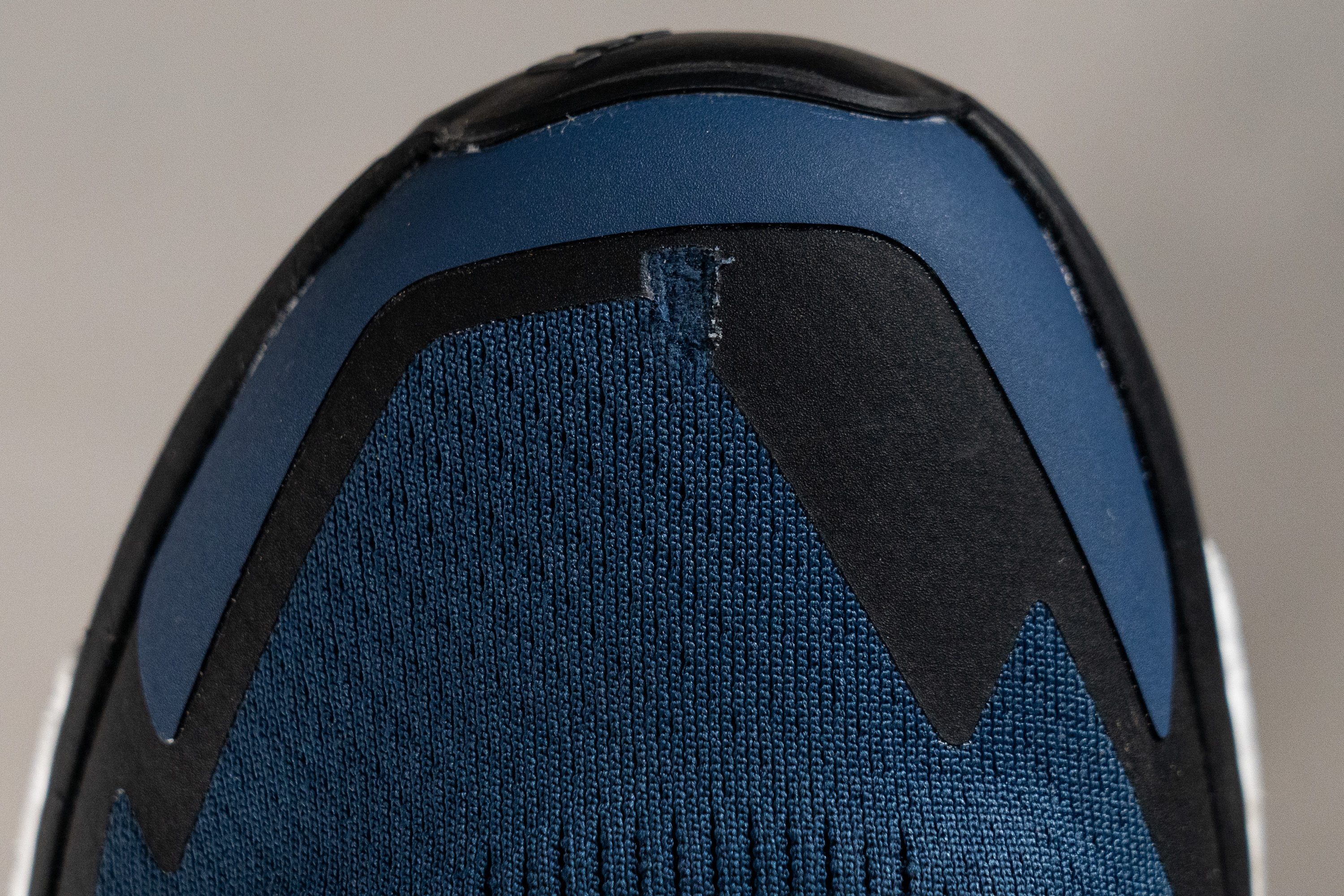
| Terrex Free Hiker 2 | 4 |
| Average | 4.3 |
Heel padding durability
Our usually destructive Dremel proved to be even more impotent against the Free Hiker 2’s heel collar. The tool’s grinding element couldn’t even pierce the lining and left the boot’s pillowy padding intact once the four seconds were up.
This stellar performance earns the Free Hiker 2 a perfect 5 out of 5 for heel padding durability. More than anything, this speaks to the high quality of the materials and how well-constructed this boot is. This almost certainly factors into the Free Hiker 2’s steep price tag.
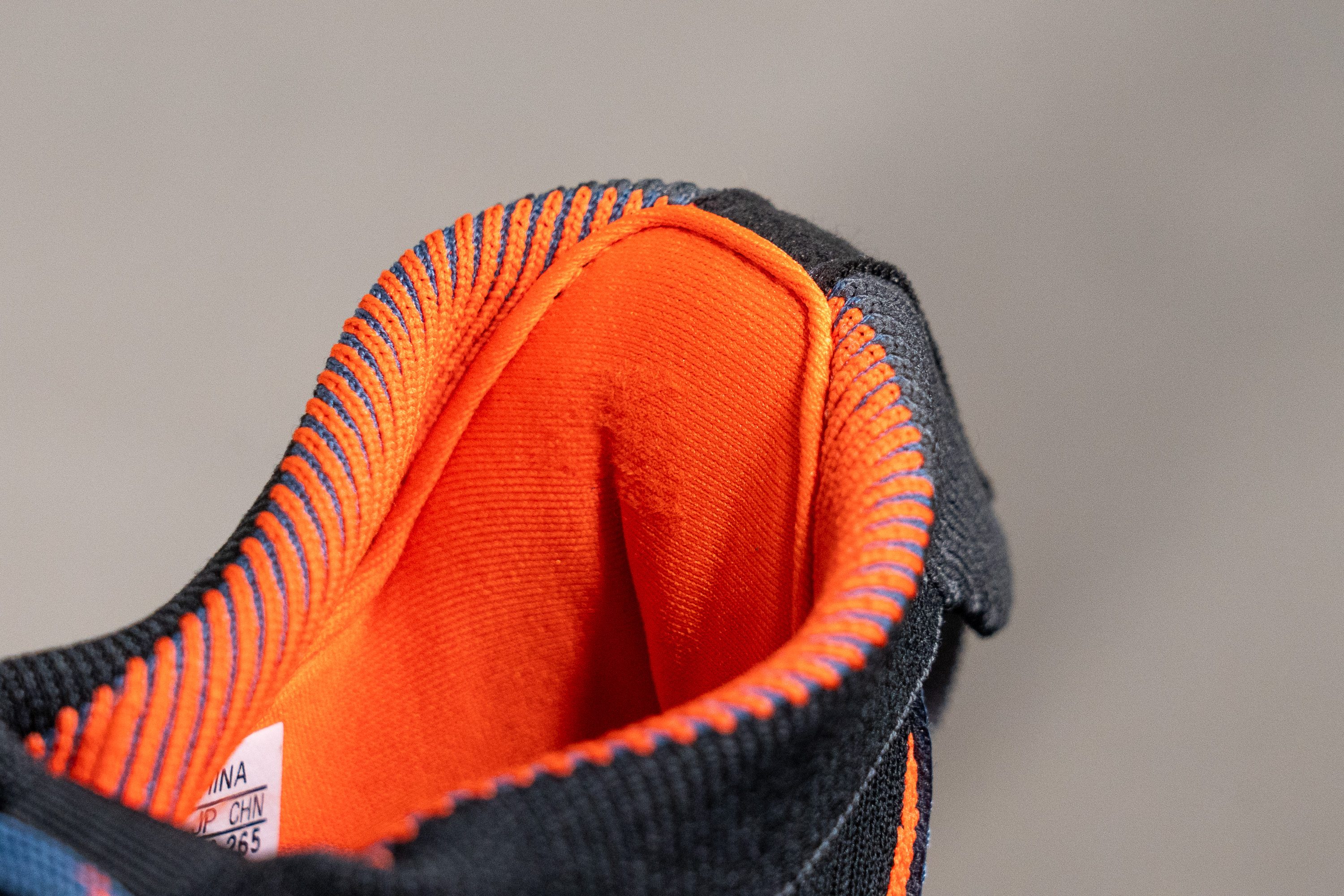
| Terrex Free Hiker 2 | 5 |
| Average | 3.6 |
Outsole hardness
The Free Hiker 2’s outsole is softer than average, giving us a durometer reading of 81.5 HC. This, however, gives us no cause for concern as the Continental rubber that makes us the outsole is renowned for its excellent traction and top-notch durability, the latter of which will be put to the test in the next section.
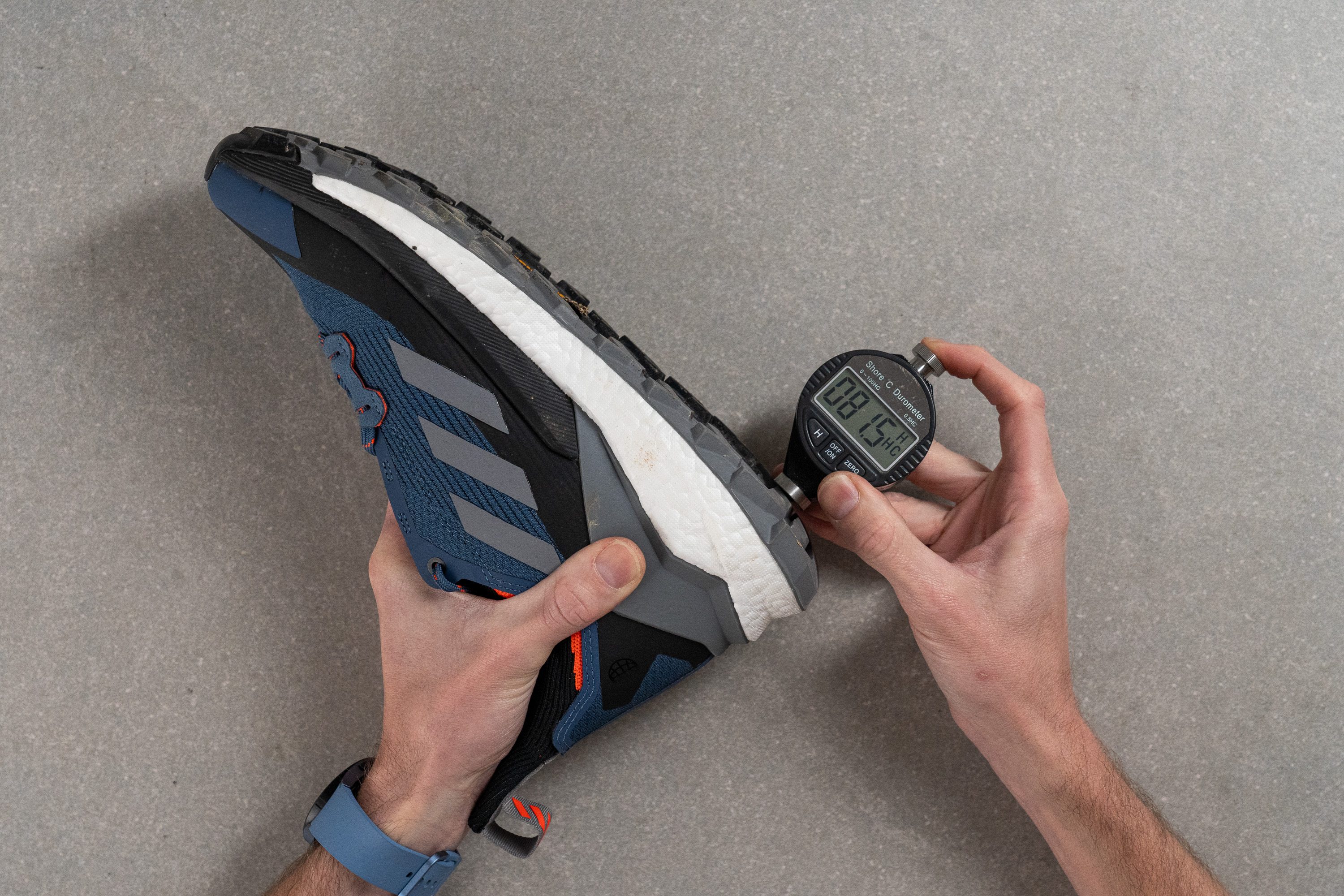
| Terrex Free Hiker 2 | 81.5 HC |
| Average | 87.1 HC |
Outsole durability
As expected, our Dremel’s grinding element wasn’t able to do much despite spinning at 10K RPM for twenty agonizing seconds.
Assessing the “damage” in the aftermath with our tire tread gauge, we found that we had only ground off 0.24 mm of rubber from one of the lugs. This makes the Free Hiker 2’s outsole much more durable than our current lab average and means that we expect this boot to survive dozens of challenging treks before the lugs are compromised.
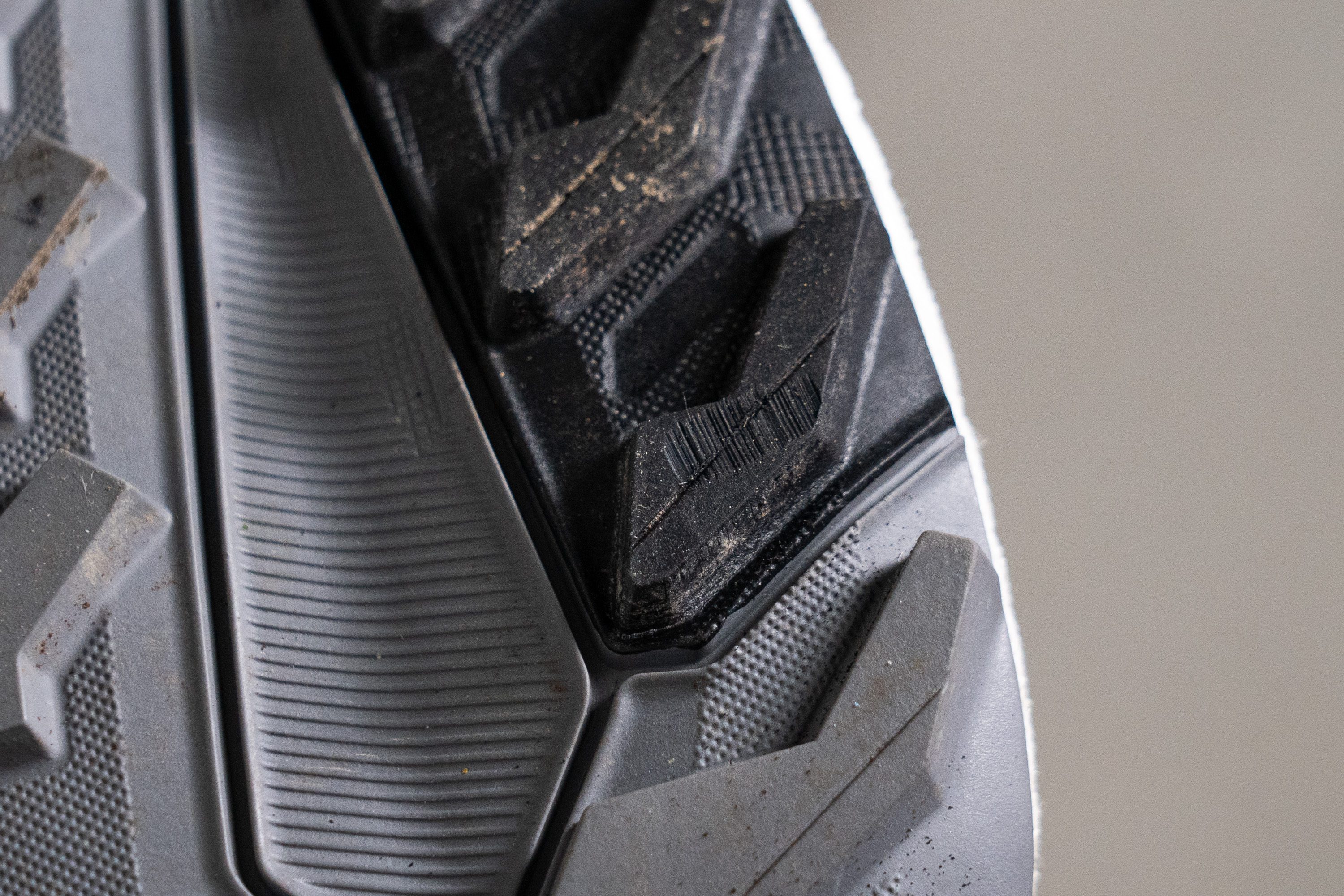
| Terrex Free Hiker 2 | 0.2 mm |
| Average | 0.8 mm |
Outsole thickness
At 3 mm thick, the Free Hiker 2’s outsole is right on par with our current lab average.
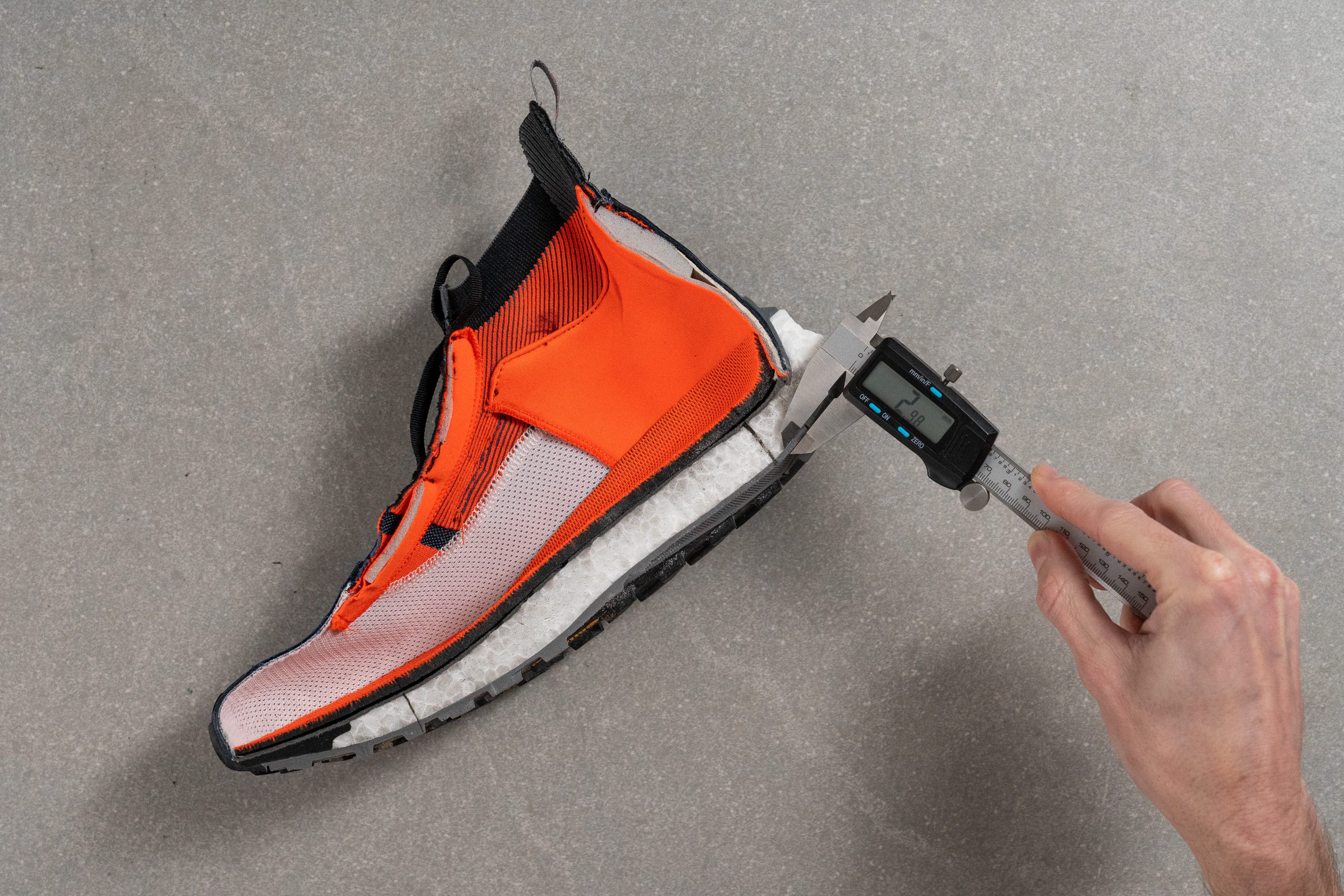
| Terrex Free Hiker 2 | 3.0 mm |
| Average | 2.9 mm |
Misc
Insole thickness
At 5 mm thick according to our caliper measurements, the Free Hiker 2's insole is just shy of our current lab average. Nevertheless, we enjoyed a comfy and well-padded within the shoe that nicely complements the midsole cushioning.
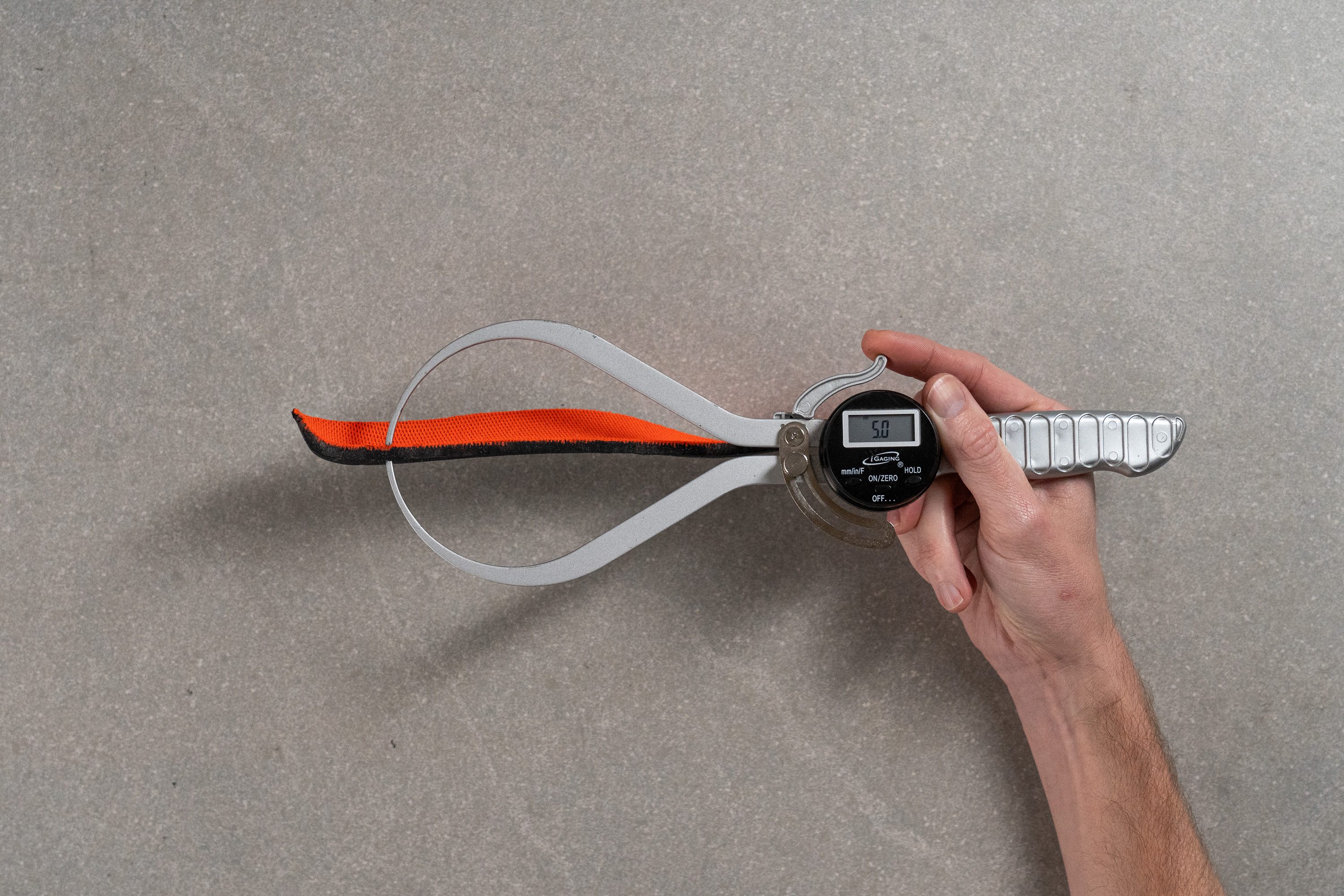
| Terrex Free Hiker 2 | 5.0 mm |
| Average | 6.0 mm |
Removable insole
The insole is fully removable, so those in need of added arch support in the form of custom orthotics should be able to use them with this boot.
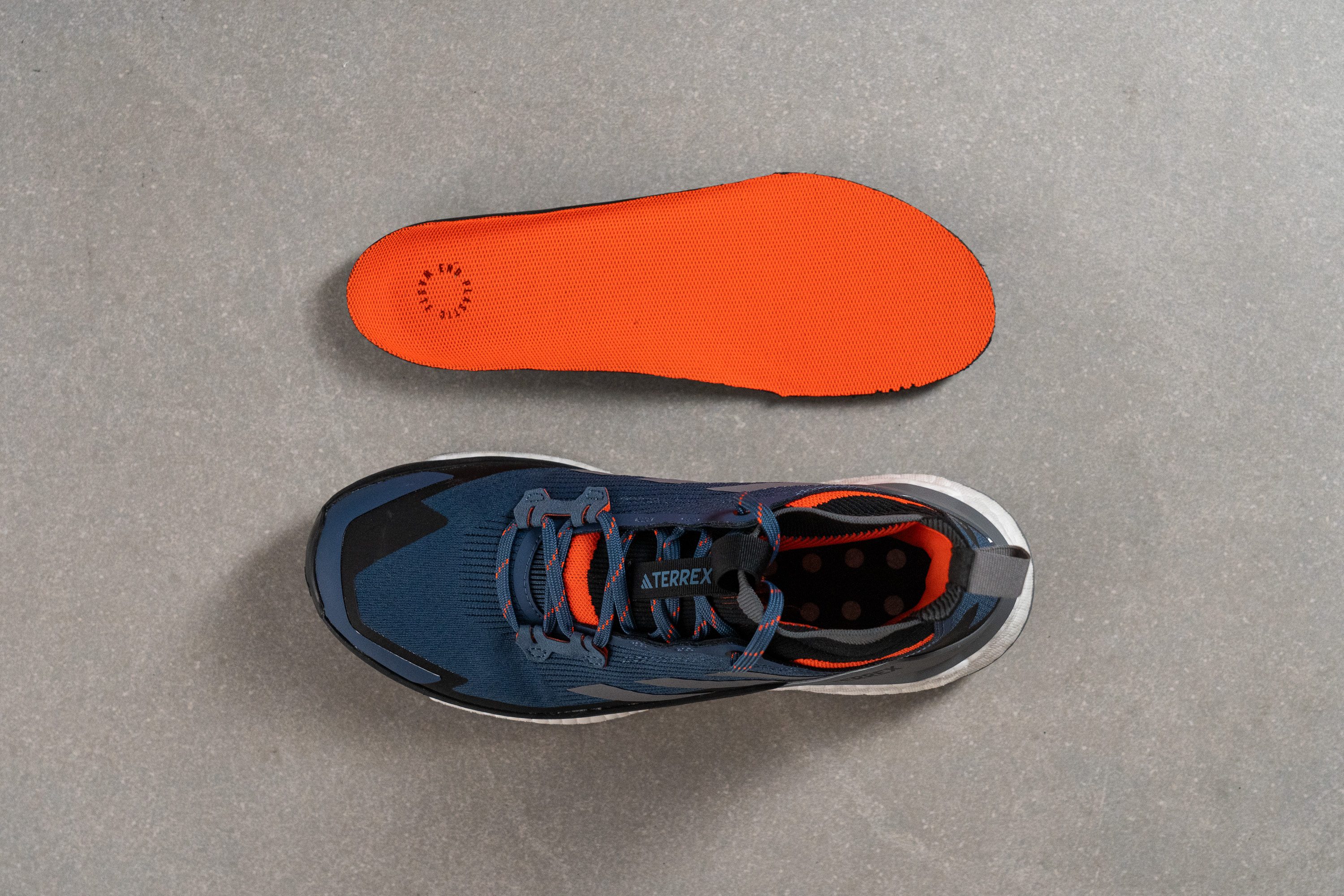
| Terrex Free Hiker 2 | Yes |
Midsole softness in cold (%)
To test the effects of cold conditions on the midsole, we placed the Free Hiker 2 in the freezer for twenty minutes. Once sufficiently chilled, we found that the midsole became 49.5% more firm than at room temperature. This change is more drastic than what we see in the average hiking boot, which means that the Free Hiker 2 will feel a little different underfoot as the seasons change.
However, with a post-freezer durometer reading of 23 HA, the Free Hiker 2 remains much softer than the average hiking boot at room temperature! As such, it should still provide excellent and forgiving cushioning all year round. Despite being less consistent than the average shoe under similar conditions, this is still a remarkably soft reading that’s less firm than the average hiking boot at room temperature!
| Terrex Free Hiker 2 | 50% |
| Average | 20% |
Reflective elements
The Free Hiker 2 doesn’t feature any reflective elements, so we recommend exercising caution and using additional high-vis gear if hiking on the side of a road at night.
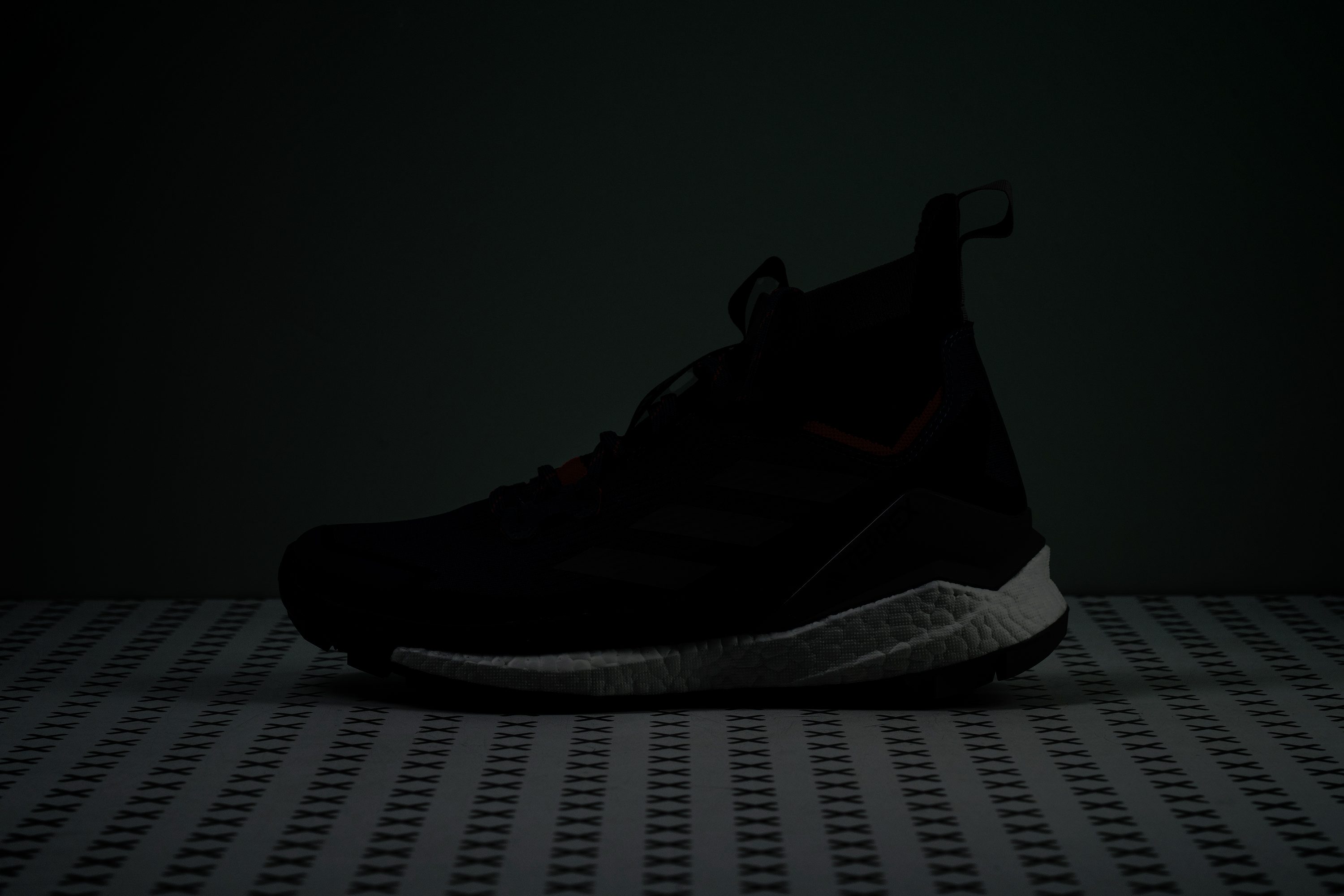
| Terrex Free Hiker 2 | No |
Tongue padding
At 7.1 mm thick according to our caliper measurements, the Free Hiker 2’s tongue isn’t as padded as our current lab average. Despite this, however, we still found the shoe to be very comfortable around the instep with no hint of lace once we had secured the boot to our foot.
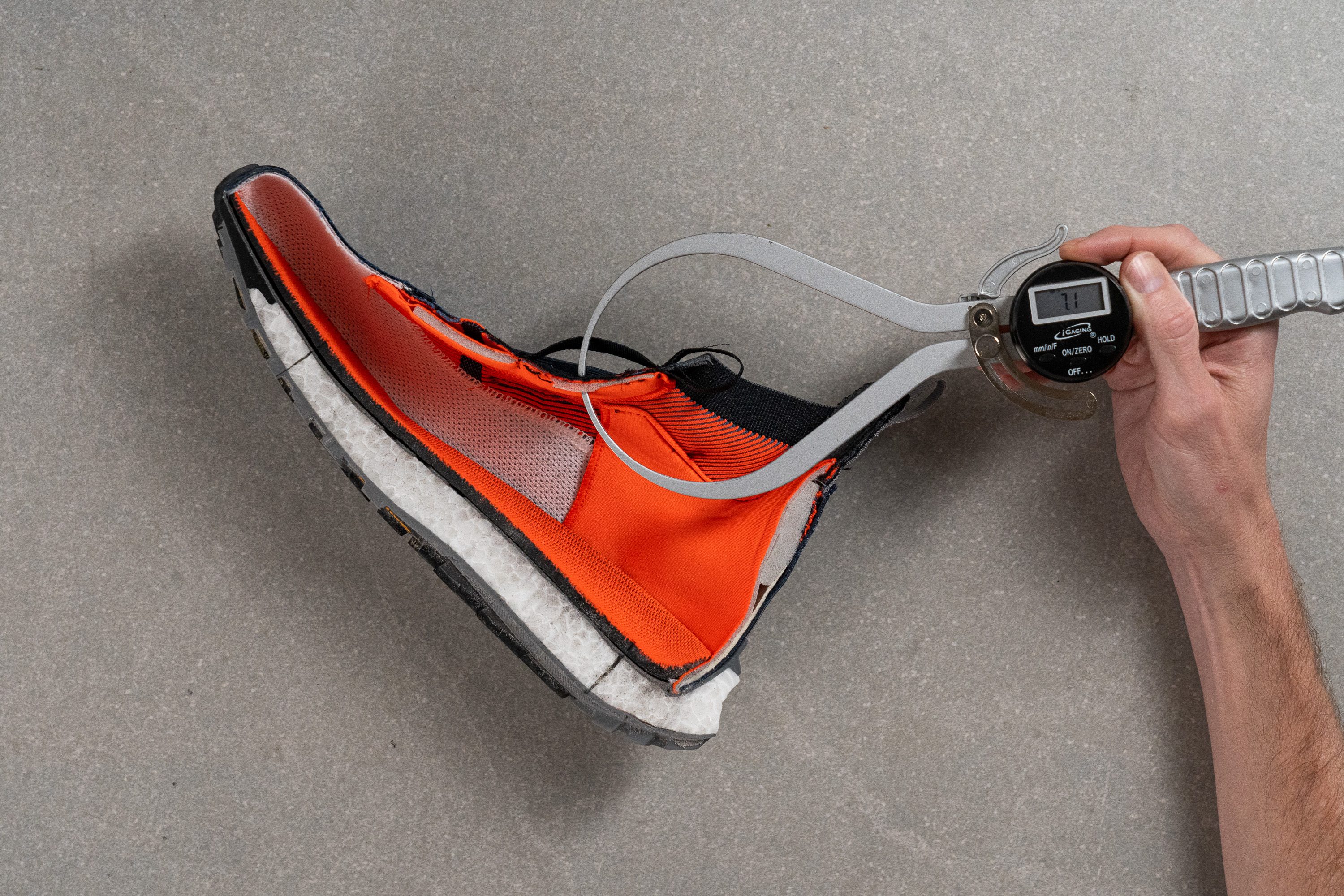
| Terrex Free Hiker 2 | 7.1 mm |
| Average | 11.2 mm |
Tongue: gusset type
While sock-like fits aren’t typically lauded for their ability to secure the foot in place, the Free Hiker 2’s snug collar had us feeling well locked into the boot as we traversed the wilderness.
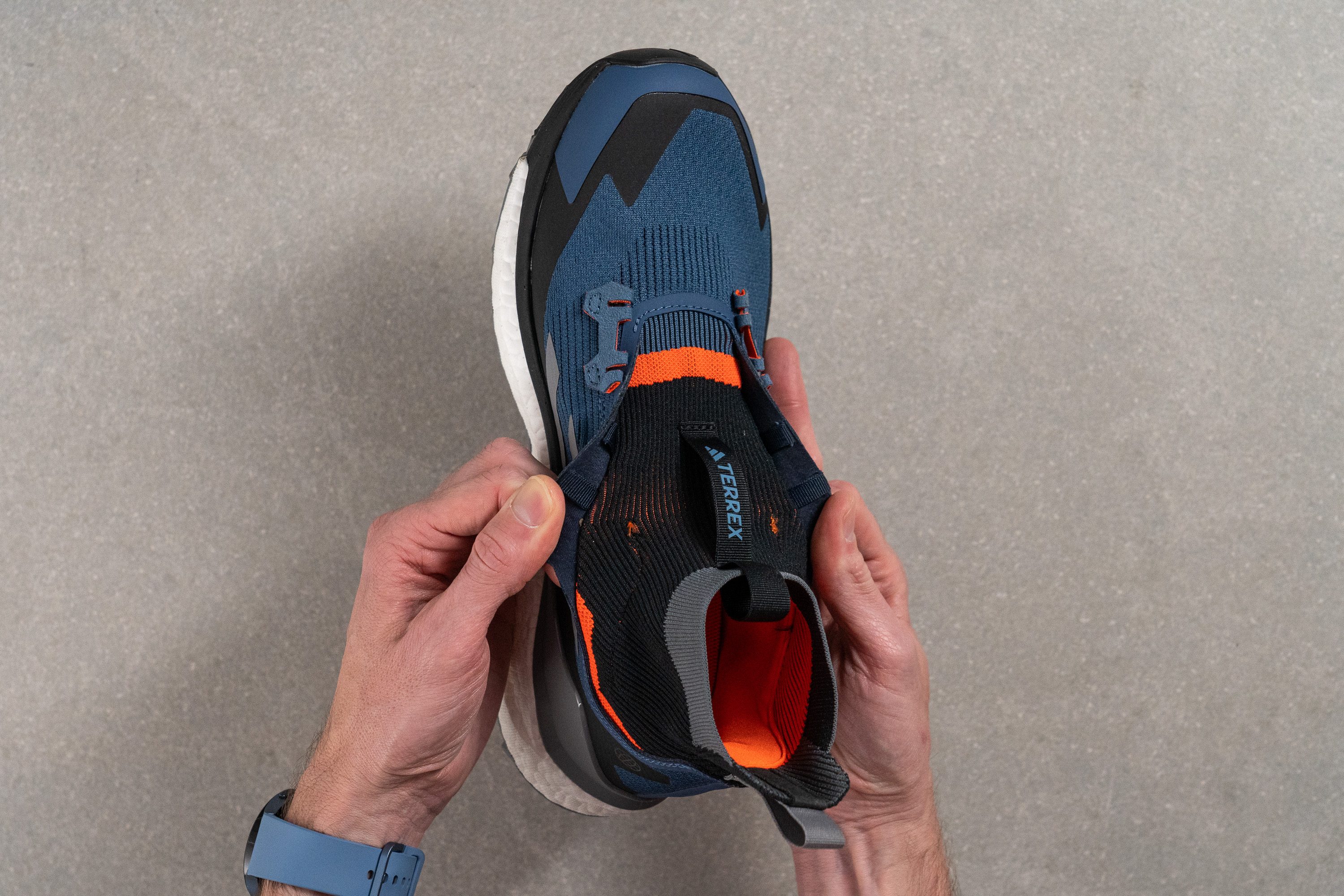
On the flip side, putting the boot on is quite the infernal struggle that has us frantically squeezing our foot through the tight opening whenever we take them out for a trek.
| Terrex Free Hiker 2 | Sock like |
Heel tab
The Free Hiker 2 sports a little finder loop at the top of the heel that’s useful for hooking onto as we wrestle the boot onto our foot.
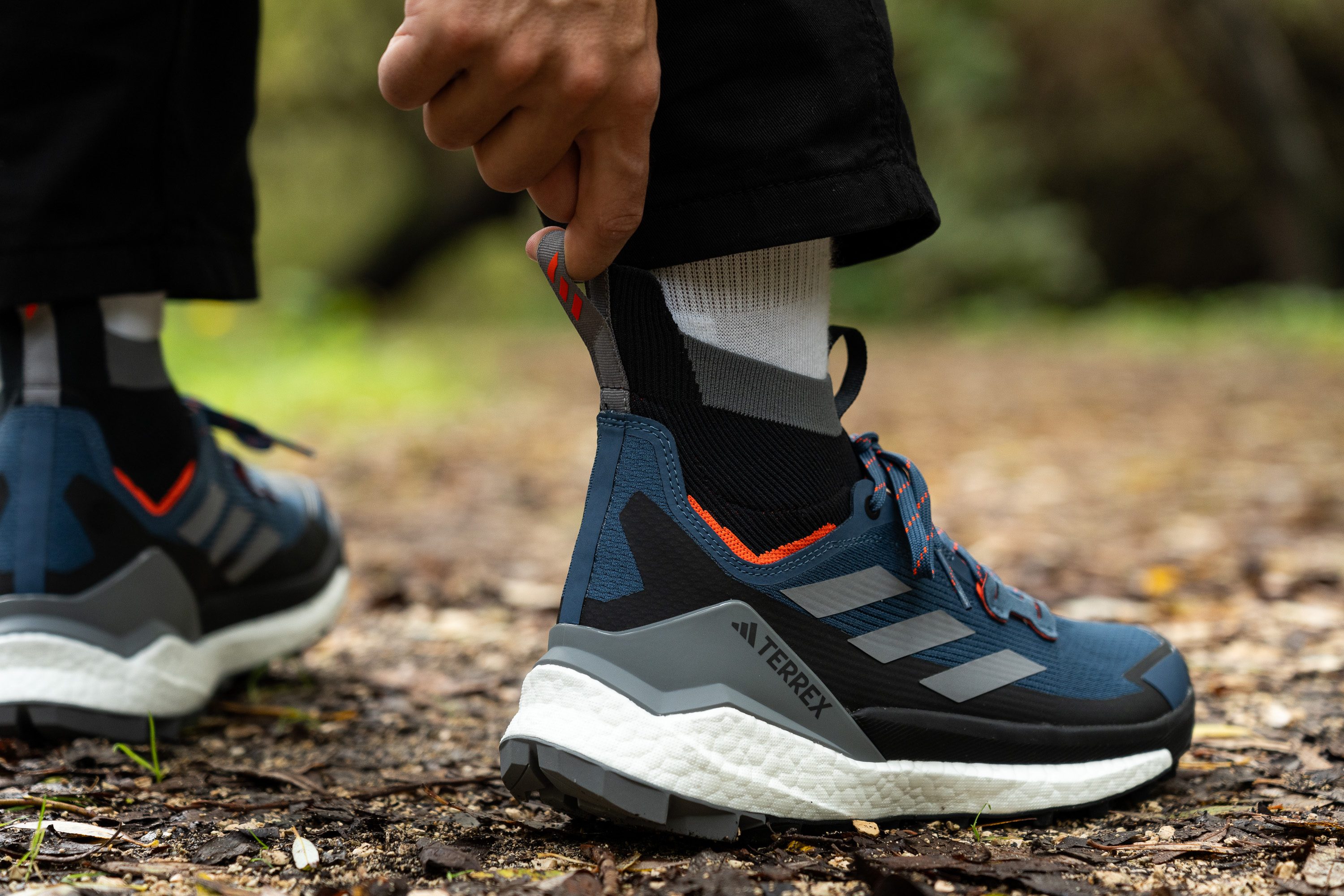
| Terrex Free Hiker 2 | Finger loop |

